Archives
-
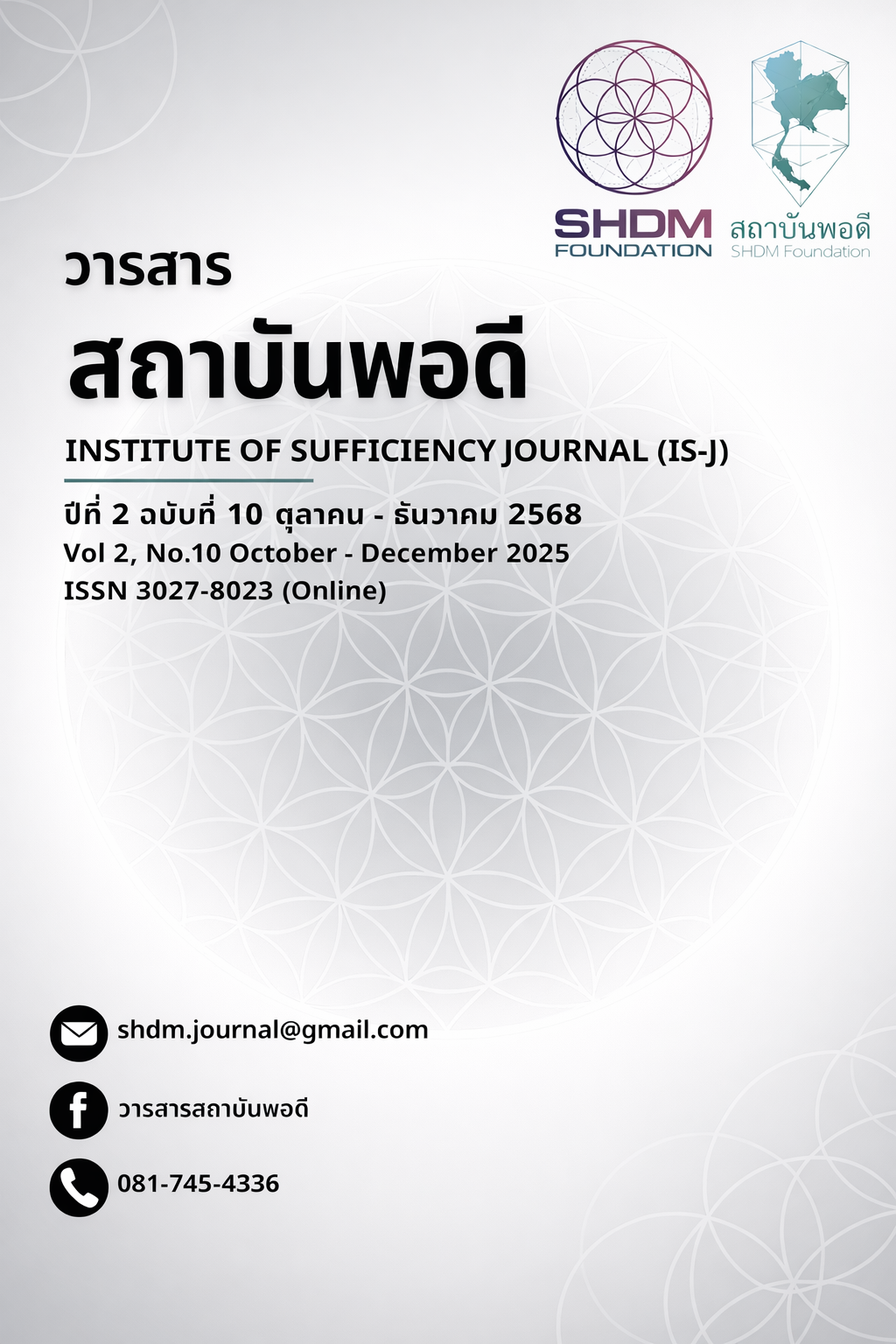
December
Vol. 2 No. 10 (2025)Editorial Journal of Sufficiency Institute, Vol. 2, No. 10, December 2025The Journal of Sufficiency Institute, Vol. 2, No. 10 (December 2025), continues to attract strong interest from scholars, researchers, and readers across a wide range of academic fields, including education, business administration, marketing, and applied Buddhist philosophy. The journal has also received valuable cooperation from distinguished external reviewers, whose contributions play a vital role in maintaining the academic rigor and credibility of the publication.
This issue consists of two research articles and three academic articles, all of which reflect the diversity of knowledge integrating marketing, business, management, and Buddhist philosophical perspectives. The details of the articles are as follows.
Research Articles1. An Analytical Study of the Definition of Non-Technical Skills in the Context of Life Skills, Thinking, and Relationships
— Dr. Dinh Supasamut
— Independent Scholar2. The Development of Leadership through Khanti Parami Based on Theravada Buddhist Philosophy
Academic Articles
— Chisa Kanyawiriya and Sirin Kanyawiriya
— Philosophy and Ethics Program, Graduate School, Suan Sunandha Rajabhat University1. Driving the IDG Leadership Network in Thailand: An Analytical Study and Recommendations of Dr. Potjanart Seebungkerd (Coach Jimi)
— Center of Sufficiency Studies
— Graduate School, Suan Sunandha Rajabhat University2. Business Administration Based on the Practice of Khanti Parami
— Sirin Kanyawiriya and Chisa Kanyawiriya
— Lor Yaowaraj Bangkok (1997) Co., Ltd.3. The Application of the 22th Royal Working Principle: Perseverance
— Chairoj Nopchalermroj
— Nopchalermroj FoundationAll articles published in this issue have undergone an initial screening by the editorial board and were subsequently reviewed by three external experts in accordance with the standards of the Thai Journal Citation Index Centre (TCI). This rigorous process ensures academic accuracy, conceptual coherence, and practical value applicable to contemporary social contexts.
The editorial board believes that this issue will contribute significantly to the advancement and dissemination of knowledge in marketing, management, and Buddhist ethics, fostering development at the individual, organizational, and societal levels. The editorial board would like to express its sincere appreciation to the reviewers, authors, and readers for their continued support in strengthening and sustaining the growth of the Journal of Sufficiency Institute.
Assoc. Prof. Dr. Metha Hrimtepathip
Editor-in-Chief -
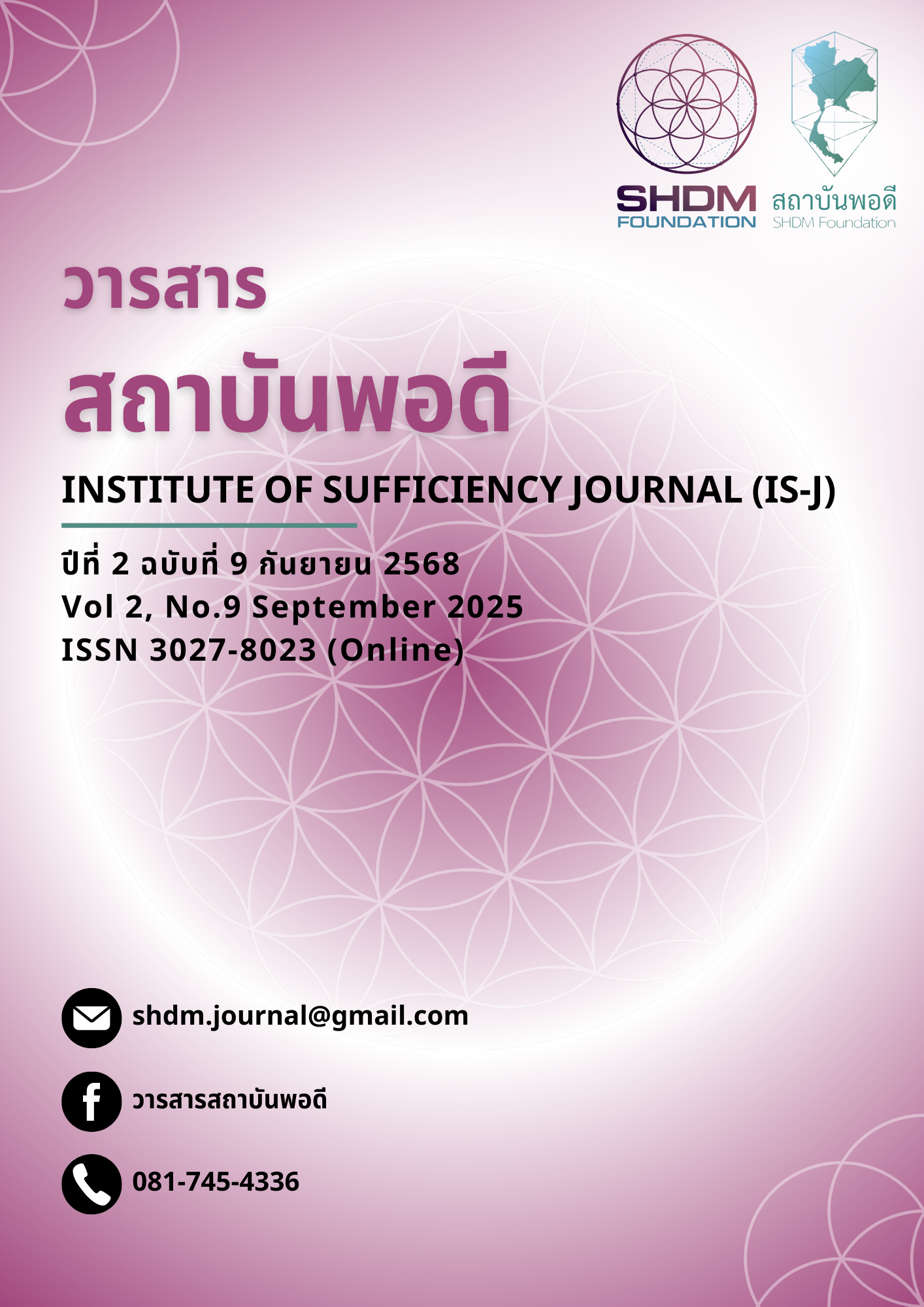
September
Vol. 2 No. 9 (2025)EditorialInstitute of Sufficiency Journal, Vol. 2, No. 9, September 2025
The Institute of Sufficiency Journal, Vol. 2, No. 9 (September 2025), continues to attract attention from scholars, researchers, and interested readers across various disciplines, including education, business administration, marketing, and applied Buddhist philosophy. The journal also receives strong support from the distinguished reviewers who play a crucial role in maintaining the rigor and credibility of the journal.
This issue consists of 2 research articles and 3 academic articles, reflecting the diversity of knowledge that bridges marketing, business, leadership, and Buddhist ethics. The details are as follows:
Research Articles-
An Analytical Study of Non-Technical Skills for Quality of Life Development
Dinh Supasamut (Dr.)
Independent Scholar -
Leadership Development through the Perfection of Viriya Parami
Chisa Gunyaviriya & Sirin Gunyaviriya
Philosophy and Ethics Program, Graduate School, Suan Sunandha Rajabhat University
-
Driving the IDG Leadership Network in Thailand: An Analytical Study and Recommendations of Phramaha Maghavin Purisuttamo
Center of Sufficiency Studies
Graduate School, Suan Sunandha Rajabhat University -
Business Administration Based on the Practice of Viriya Parami
Sirin Gunyaviriya & Chisa Gunyaviriya
Lor Yaowaraj Bangkok Co., Ltd. (1997) -
The Application of the 21st Royal Working Principle: Working with Happiness
Chairoj Nopchalermroj
Nopchalermroj Foundation
All articles in this issue have undergone an initial review by the editorial board and were further evaluated by three external reviewers in accordance with the standards of the Thai Journal Citation Index (TCI). This ensures academic accuracy, relevance, and practical value in contemporary contexts.
The editorial board firmly believes that this issue will contribute to advancing knowledge in various dimensions—marketing, business, and Buddhist ethics—leading to the development of individuals, organizations, and society as a whole. The editorial board would like to extend sincere appreciation to the reviewers, researchers, and readers who continue to support the steady growth of the Institute of Sufficiency Journal.
Assoc. Prof. Dr. Metha Rimthepadhiv
Editor-in-Chief -
-
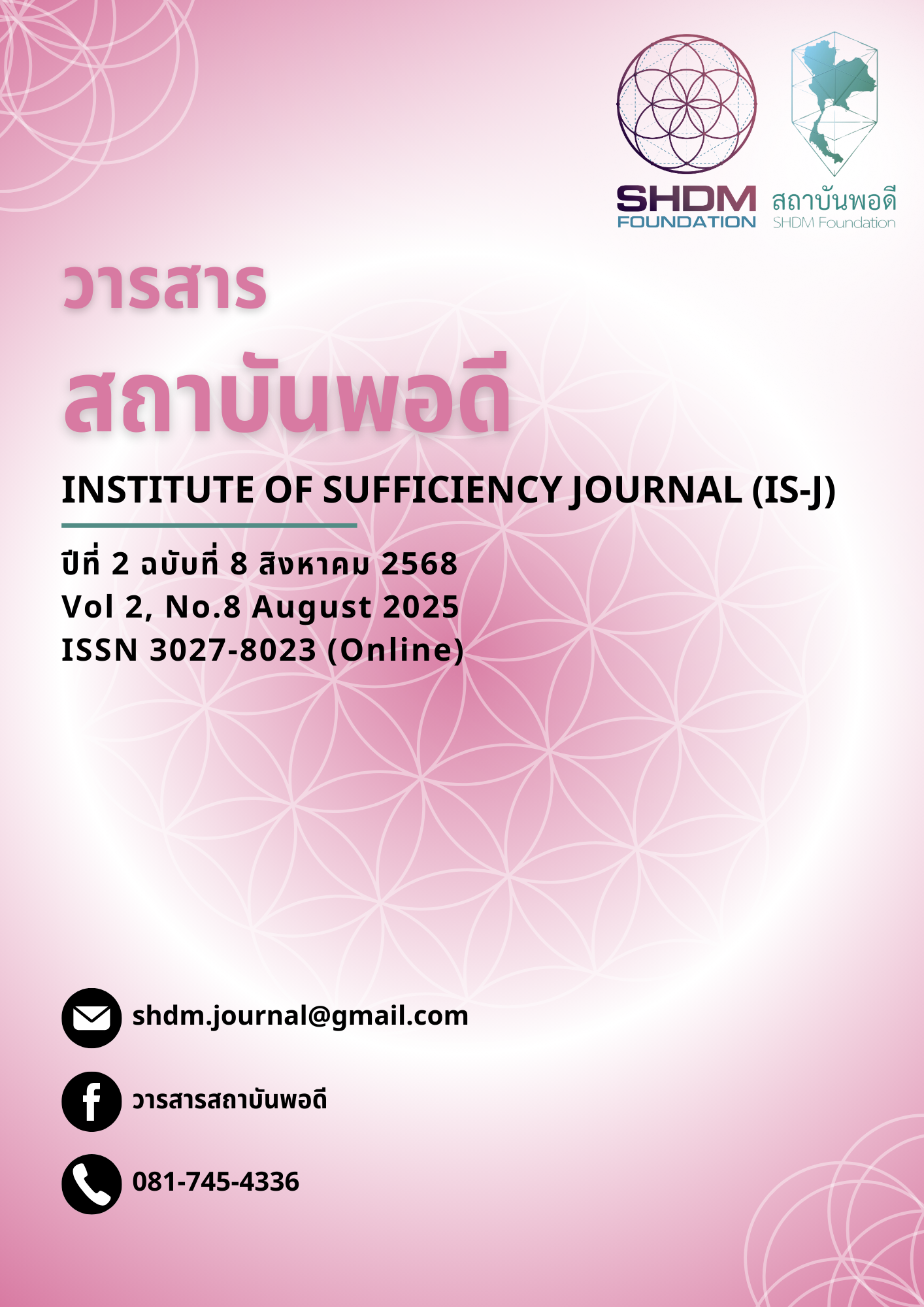
August
Vol. 2 No. 8 (2025)EditorialInstitute of Sufficiency Journal, Vol. 2, No. 8, August 2025
The Institute of Sufficiency Journal, Volume 2, Issue 8, August 2025, continues to receive significant attention from scholars, researchers, and readers across various disciplines, including education, business administration, marketing, and applied Buddhist philosophy. This issue has also been made possible through the valuable contributions of external reviewers, whose expertise ensures the journal maintains high academic standards, credibility, and reliability.
This issue comprises three research articles and two academic articles, reflecting the journal’s commitment to presenting diverse and in-depth knowledge that bridges the fields of marketing, business, and Buddhist philosophy. The articles are as follows:
Research Articles
-
Marketing Mix Factors Influencing the Purchase Decision of Residential Real Estate
Zilong Cheng & Bandit Prapratanporn -
Marketing Mix Factors Influencing the Decision to Use Commercial Banking Services via Mobile Phones in Bangkok
Chantima Phuasue & Bandit Prapratanporn -
Leadership Development through the Perfection of Nekkhamma Parami
Chisa Kanyawiriya & Sirin Kanyawiriya
Academic Articles
-
Business Administration Based on the Practice of Nekkhamma Parami
Sirin Kanyawiriya & Chisa Kanyawiriya -
The Application of the 20th Royal Working Principle: Honesty, Integrity, and Sincerity towards One Another
Chairot Nopchalermrot
All articles have undergone an initial review by the editorial team and were subsequently evaluated by three external experts, in accordance with the standards of the Thai Journal Citation Index Centre (TCI). The rigorous review process ensures that each article demonstrates academic accuracy, alignment with the journal’s objectives, and potential to contribute practical value to individuals, organizations, and society at large.
The editorial board firmly believes that this issue of the journal will play a constructive role in advancing interdisciplinary knowledge, particularly in the areas of marketing, management, and Buddhist ethics, while supporting the sustainable development of Thai society. The board extends its sincere gratitude to the reviewers, authors, and readers for their contributions to the continued growth of the Institute of Sufficiency Journal.
Assoc. Prof. Dr. Metha Rimthepathip
Editor-in-Chief -
-
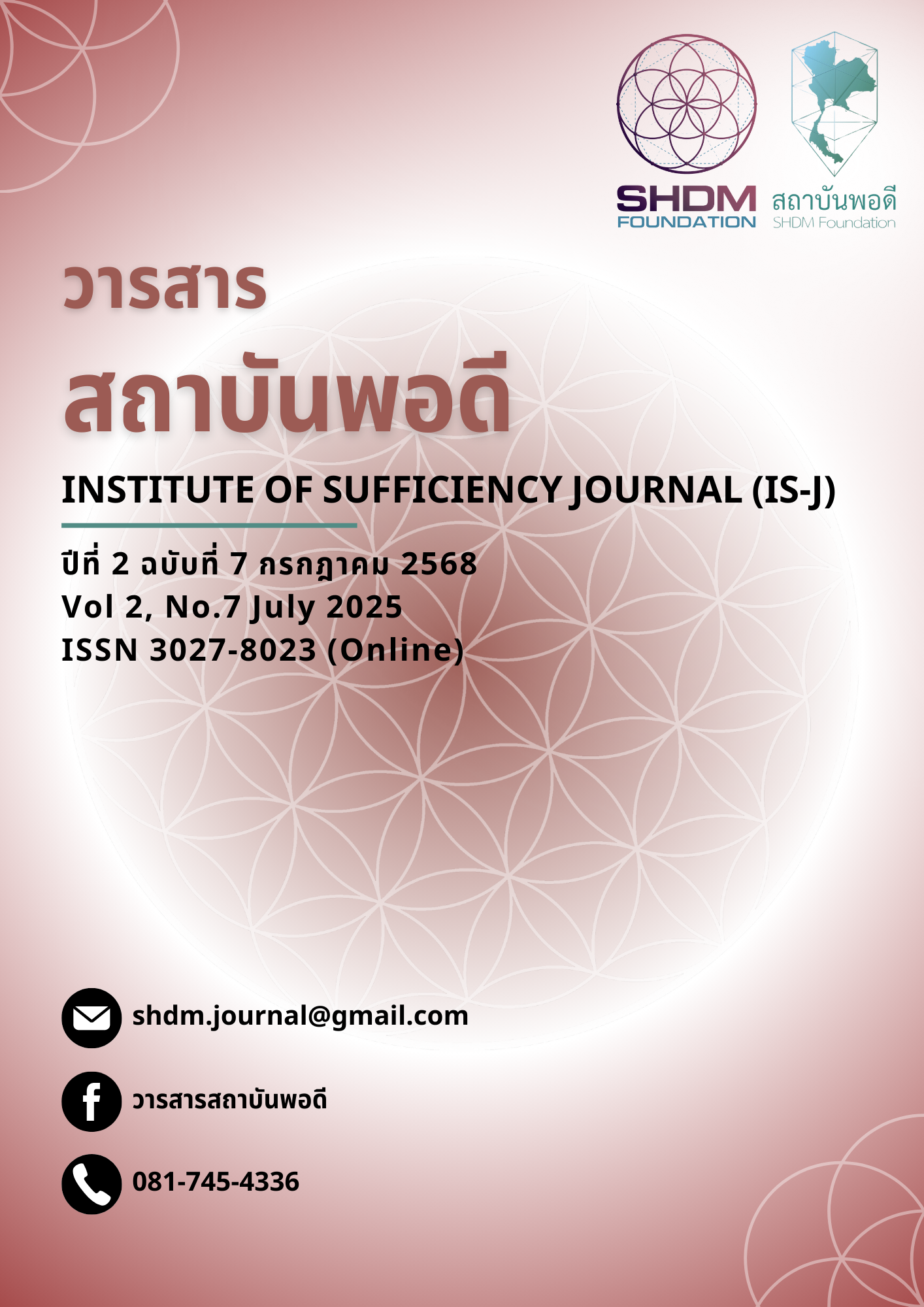
๋July
Vol. 2 No. 7 (2025)Editorial Note
Institute of Sufficiency Journal, Volume 2, Issue 7 (July 2025)The Institute of Sufficiency Journal, Volume 2, Issue 7 (July 2025), continues to receive positive responses from scholars, researchers, and readers across a wide range of disciplines—including education, administration, applied ethics, and linguistics. The journal has also benefited from the collaboration of knowledgeable experts who have served professionally as academic advisors and editorial board members.
Importantly, the journal places special emphasis on the role of peer reviewers, who are carefully selected based on the content and academic discipline of each submitted article. These reviewers are external experts who are independent from the editorial board, ensuring that the review process remains impartial, transparent, and in strict accordance with the standards set by the Thai Journal Citation Index Centre (TCI).
This issue features a total of five articles, consisting of one research article and four academic articles. Although the number of research submissions is fewer than in the previous issue, this volume maintains its depth and breadth of content—exploring diverse areas such as leadership development, moral philosophy, applied Buddhism, regional linguistics, and sufficiency economy. The featured articles are as follows:
Research Article
-
Leadership Development through the Practice of Sila Parami
(การพัฒนาภาวะผู้นำด้วยศีลบารมี)
Academic Articles
-
The Comparative Analysis of the Meaning of the Word "Kue" in Southern Thai Dialect, Jeh He Accent, and the Word "Ko" in Standard Thai
(การวิเคราะห์เชิงเปรียบเทียบความหมายของคำ “กือ” ในภาษาไทยถิ่นใต้ สำเนียงเจ๊ะเห และคำ “ก็” ในภาษาไทยมาตรฐาน) -
Leadership of the Three Heroes of the Three Kingdoms: An Analysis of Ethics and Strategy
(ภาวะผู้นำสามบุรุษแห่งสามก๊ก: การวิเคราะห์จริยธรรมและกลยุทธ์) -
Business Administration Based on the Practice of Sila Parami
(การบริหารธุรกิจบนพื้นฐานของศีลบารมี) -
The Application of the 19th Royal Working Principle: Sufficiency Economy
(การประยุกต์ใช้หลักการทรงงานข้อที่ 19 : เศรษฐกิจพอเพียง)
All articles have undergone an initial screening by the editorial board, followed by a thorough double-blind peer review by three qualified experts. Emphasis was placed on academic rigor, alignment with the journal's objectives, and the potential for practical application at the individual, community, and organizational levels.
The editorial board sincerely hopes that this issue will contribute meaningfully to the advancement of knowledge in the fields of education, administration, language studies, and applied philosophy. It is our aspiration that the Institute of Sufficiency Journal continues to serve as a dynamic platform for scholarly dialogue, fostering academic growth and sustainable development in Thai society.
Assoc. Prof. Dr. Metha Harimtepathip
Editor-in-Chief -
-
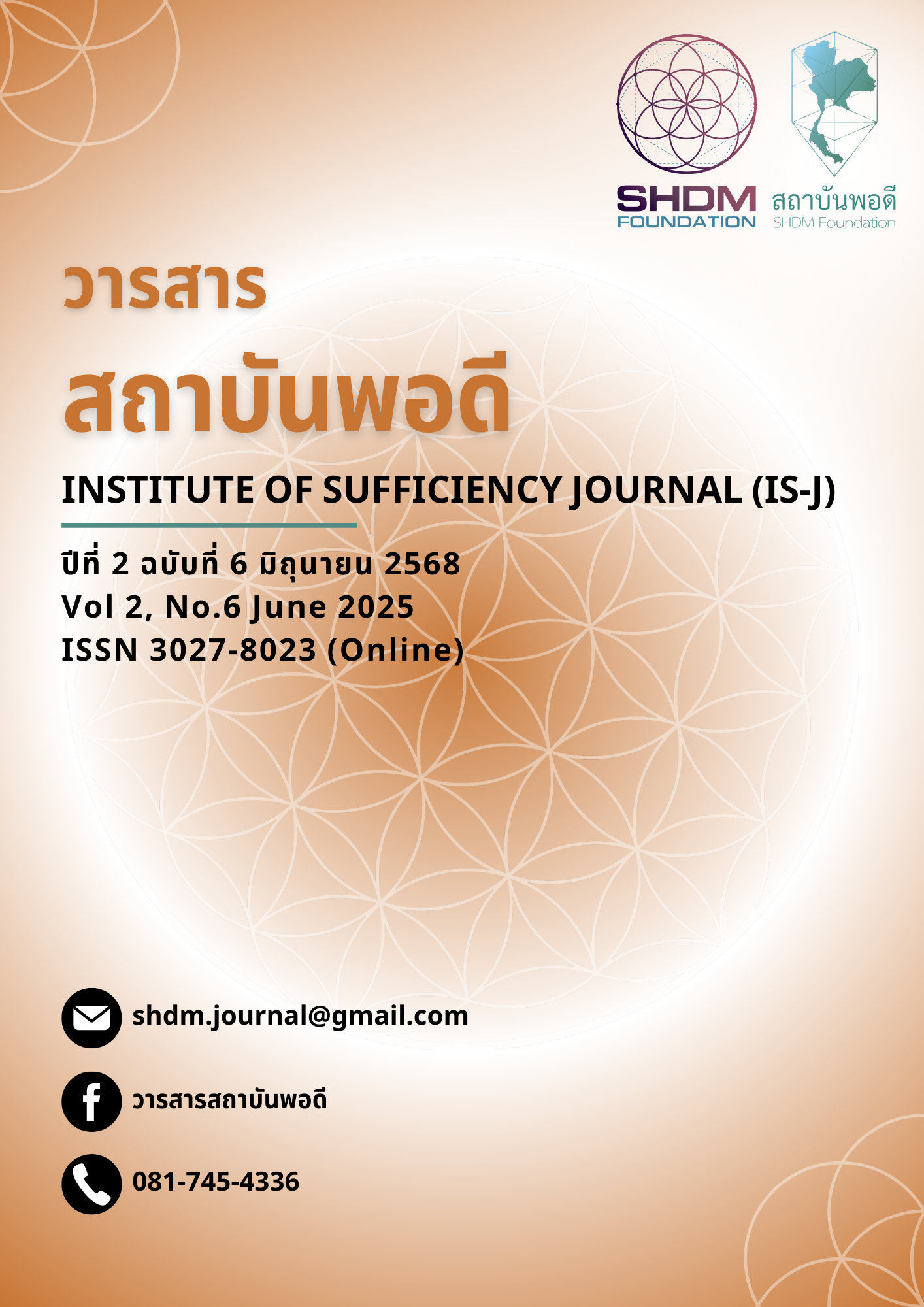
June
Vol. 2 No. 6 (2025)Editorial
Pordee Institute Journal, Volume 2, Issue 6, June 2025The Pordee Institute Journal, Volume 2, Issue 6, June 2025, continues to receive strong interest and support from researchers, academics, and faculty members from various educational institutions, as well as independent scholars who regularly submit articles for publication. We are also grateful for the support and guidance of distinguished experts in diverse disciplines who have served as advisors, editorial board members, and peer reviewers. Their expertise plays a vital role in enhancing the quality of the journal and ensuring its alignment with the standards of the Thai Journal Citation Index Centre (TCI).
This issue comprises four research articles and two academic articles, representing a wide range of knowledge across the fields of education, leadership, management, and applied Buddhist philosophy. The articles featured in this issue are as follows:
Research Articles
-
Executive Leadership and the Effectiveness of Educational Institution Administration in the Digital Disruption Era of Educational Personnel, Office of the Basic Education Commission
(ภาวะผู้นำผู้บริหารกับประสิทธิผลการบริหารสถานศึกษาในยุคดิจิทัลดิสรัปชันของบุคลากรทางการศึกษา สำนักงานเขตพื้นที่การศึกษา) -
The Relationship Between Participatory Management and Organizational Commitment of Educational Personnel in a Primary Educational Service Area
(ความสัมพันธ์ของการบริหารแบบมีส่วนร่วมกับความยึดมั่นผูกพันกับองค์กรของบุคลากรทางการศึกษา สังกัดเขตพื้นที่การศึกษาประถมศึกษา) -
The Relationship Between Educational Institution Climate and Management Practices of Educational Personnel in Educational Service Area Office
(ความสัมพันธ์ของบรรยากาศสถานศึกษากับการบริหารของบุคลากรทางการศึกษา สำนักงานเขตพื้นที่การศึกษา) -
Leadership Development through the Practice of Dana Parami
(การพัฒนาภาวะผู้นำด้วยทานบารมี)
Academic Articles
-
Business Administration Based on the Practice of Dana Parami
(การบริหารธุรกิจบนพื้นฐานของทานบารมี) -
The Application of the 18th Royal Working Principle: Sufficiency for Living
(การประยุกต์ใช้หลักการทรงงานข้อที่ 18 : พออยู่พอกิน)
All articles published in this issue have been rigorously reviewed through the standard editorial process. The editorial board conducted a preliminary review to ensure alignment with the journal's objectives and practical applicability. Each article was subsequently evaluated by three qualified peer reviewers, adhering to the quality assessment framework of the Thai Journal Citation Index Centre (TCI).
The editorial board sincerely hopes that this issue will contribute meaningfully to the advancement of knowledge in education, administration, and philosophical thought, and that it will help promote sustainable development in both organizational and societal contexts.
Asst. Prof. Dr. Metha Harimthepthip
Editor-in-Chief -
-
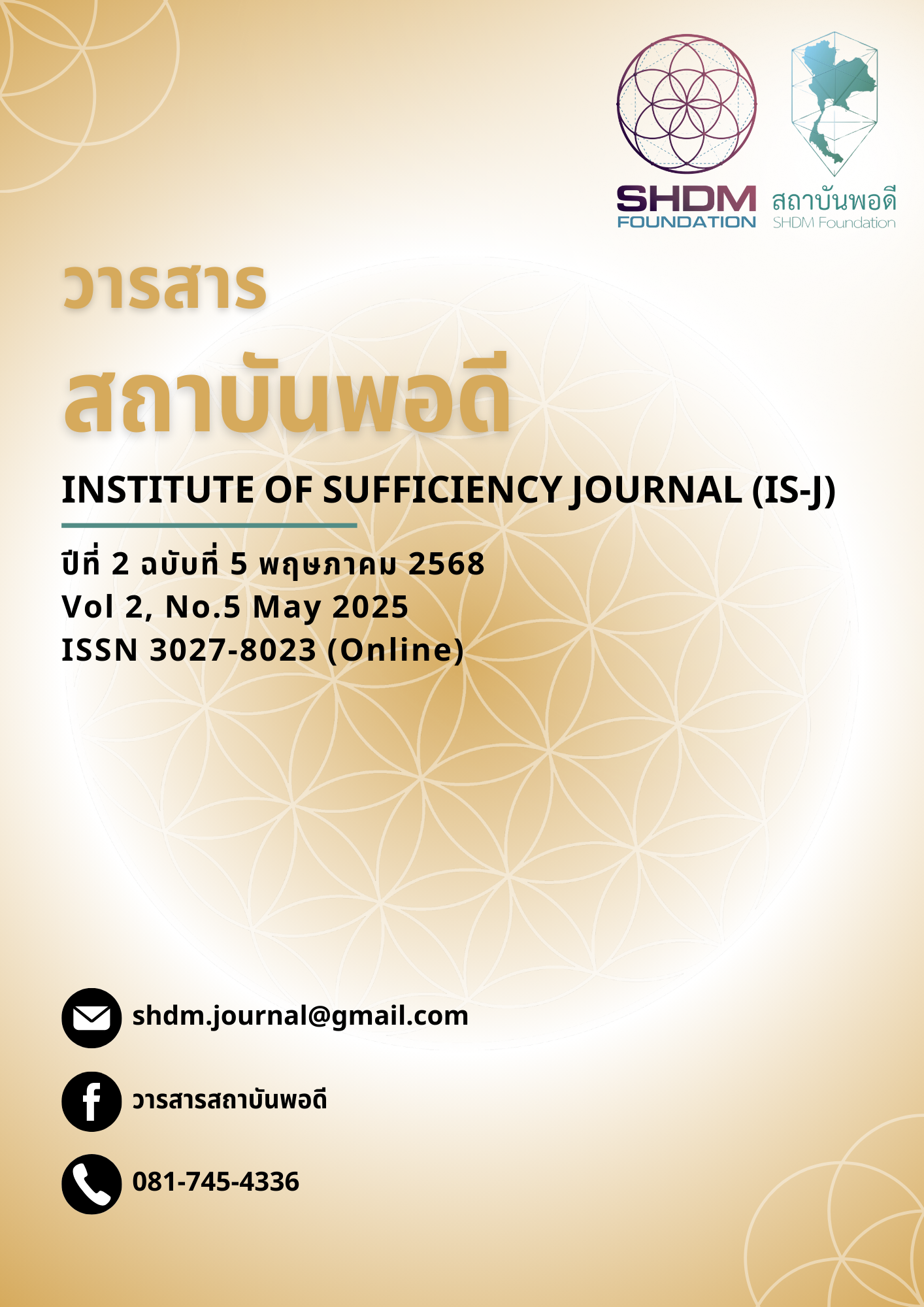
May
Vol. 2 No. 5 (2025)Editor’s Note
Institute of Sufficiency Journal, Vol. 2 No. 5, May 2025The research and academic articles published in the Institute of Sufficiency Journal, Volume 2, Issue 5, May 2025, have been well received by researchers, academics, university lecturers from various institutions, as well as independent scholars who have shown continuous interest in submitting their work for publication. The journal is also honored to receive the support of distinguished experts in multiple disciplines, who serve as advisors, editorial board members, and peer reviewers. Their expertise plays a crucial role in enhancing the academic quality of the journal in accordance with the evaluation criteria of the Thai Journal Citation Index Centre (TCI).
This issue comprises four research articles and two academic articles, as follows:
Research Articles
-
Ethical Leadership of School Administrators and Educational Administration of Educational Personnel in the Office of Educational Service Area
-
The Relationship Between Participation and Educational Administration of Educational Personnel in the Office of Educational Service Area
-
Emotional Regulation and the Effectiveness of Educational Institutions of Educational Personnel in the Office of Educational Service Area
-
Postmodern Middle Way Philosophy and the Development of Quality of Life
Academic Articles
-
Upekkha Paramita in Theravada Buddhist Philosophy
-
The Application of the 17th Royal Working Principle: Self-Reliance
All articles in this issue have undergone a thorough review process. The editorial board conducted an initial quality screening before submitting each article to three independent experts for peer review. The selection process strictly follows the standards set by the Thai Journal Citation Index Centre (TCI), with emphasis on the alignment of each article to the journal’s objectives and its contribution to applicable academic knowledge.
The editorial board sincerely hopes that the articles in this issue will significantly contribute to advancing knowledge in education, administration, philosophy, and social development, fostering the continued growth and sustainability of Thai society.
-
-
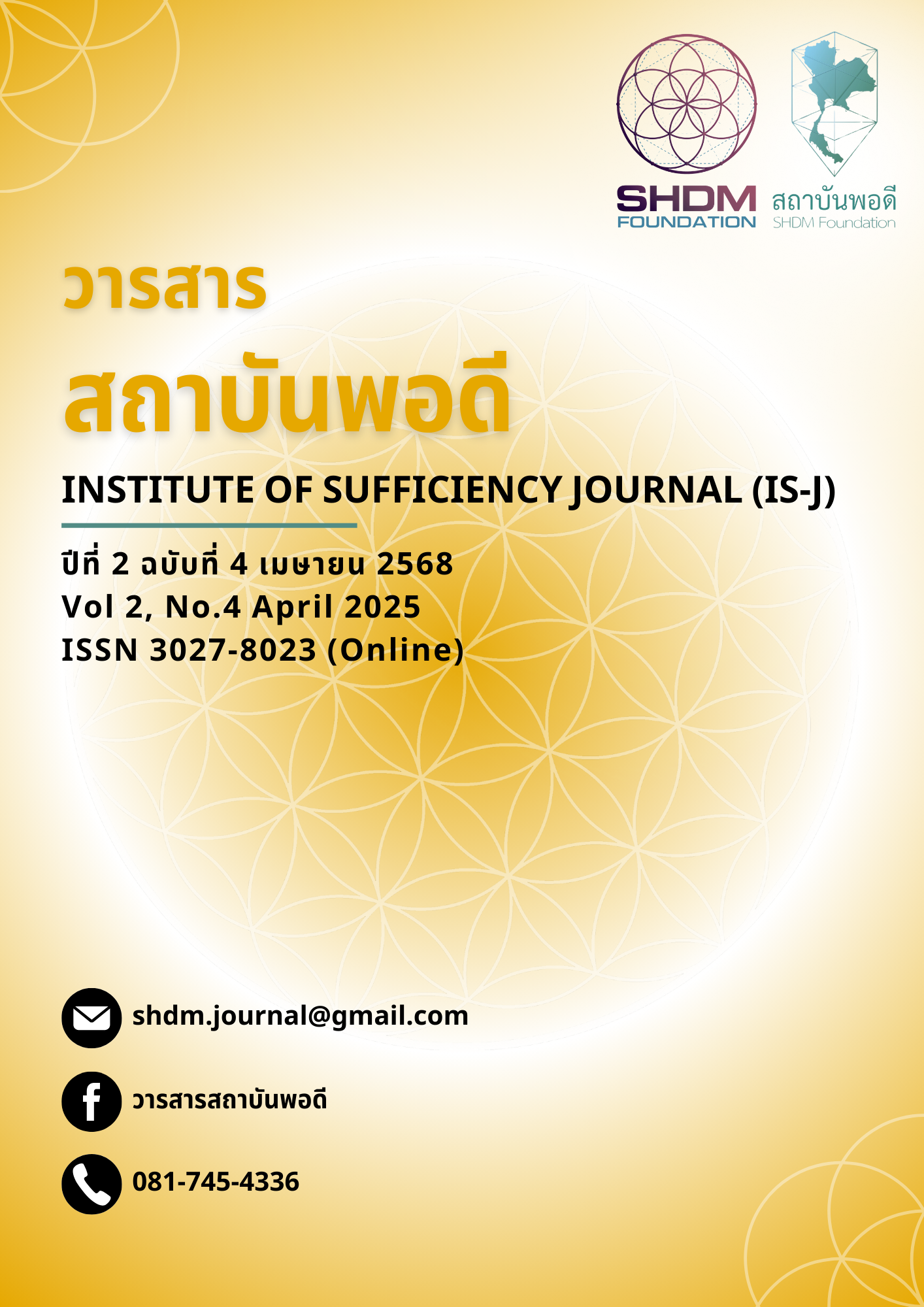
April
Vol. 2 No. 4 (2025)Editorial
Institute of Sufficiency Journal, Vol. 2 No. 4, April 2025The research and academic articles published in the Institute of Sufficiency Journal, Volume 2, Issue 4, April 2025, have been well received by researchers, academics, university lecturers from various institutions, as well as independent scholars who have shown continuous interest in submitting their work for publication. The journal is also honored to receive the support of distinguished experts in multiple disciplines, who serve as advisors, editorial board members, and peer reviewers. Their expertise plays a crucial role in enhancing the academic quality of the journal in accordance with the evaluation criteria of the Thai Journal Citation Index Centre (TCI).
This issue comprises four research articles and two academic articles, as follows:
Research Articles
-
Achievement Motivation and Educational Administration of Educational Personnel in Educational Service Area Offices
This study examined the level of achievement motivation and educational administration, as well as the relationship between them, using a quantitative research approach. The findings revealed a positive correlation between achievement motivation and educational administration, particularly in academic administration, which plays a crucial role in enhancing educational quality. -
Work-Life Balance in the Organizational Culture of Educational Personnel in an Educational Service Area Office
This study examined the levels of work-life balance, organizational culture, and the relationship between them using a quantitative survey approach. The findings indicated that both work-life balance and organizational culture were at a high level, with a statistically significant moderate positive correlation—particularly a strong link with the sense of organizational belonging. -
Mindset and Performance Outcomes of Educational Personnel in the Bangkok Primary Educational Service Area Office
This study aimed to examine the levels of mindset and performance outcomes, as well as the relationship between them among educational personnel. Utilizing a quantitative survey approach, the findings indicated that both mindset and performance outcomes were at a high level. Moreover, a statistically significant moderate positive correlation was found between mindset and performance outcomes. -
A Comparative Study of the Inner Development Goals and the Philosophy of Sufficiency Economy
This article compares the goals of the Inner Development Goals (IDGs) and the Philosophy of Sufficiency Economy by analyzing their shared and differing perspectives in both concept and application. The study proposes the H.E.A.R.T. Model as an integrated framework that supports sustainable human development at personal, organizational, and policy levels.
Academic Articles
-
Metta Parami in Theravada Buddhist Philosophy
This article explores the practice of Metta Parami in the Pali Canon through the lens of Theravada Buddhist philosophy. The study reveals that Metta Parami is not merely a basic virtue, but a profound ethical force that transforms the inner self. The proposed METTA Model—Mindful Compassion, Egoless Giving, Transcending Boundaries, Training in Equanimity, and Applied Wisdom—offers a practical framework for ethical development on personal, organizational, and societal levels. -
The Application of the 16th Royal Working Principle: Our Loss is Our Gain
This article examines the 16th Royal Working Principle, “Our loss is our gain,” through philosophical analysis, incorporating Inner Development Goals (IDGs) and the Sufficiency Economy Philosophy. It proposes the G.A.I.N. model, which reframes self-sacrifice as a profound and sustainable value. The model emphasizes inner growth, ethical alignment, social impact, and human development as pathways to meaningful and enduring transformation on individual, organizational, and societal levels.
All articles in this issue have undergone a thorough review process. The editorial board conducted an initial quality screening before submitting each article to three independent experts for peer review. The selection process strictly follows the standards set by the Thai Journal Citation Index Centre (TCI), with emphasis on the alignment of each article to the journal’s objectives and its contribution to applicable academic knowledge.
The editorial board sincerely hopes that the articles published in this issue will serve as a valuable contribution to advancing knowledge in education, administration, philosophy, and sustainable social development in Thailand and beyond.
-
-
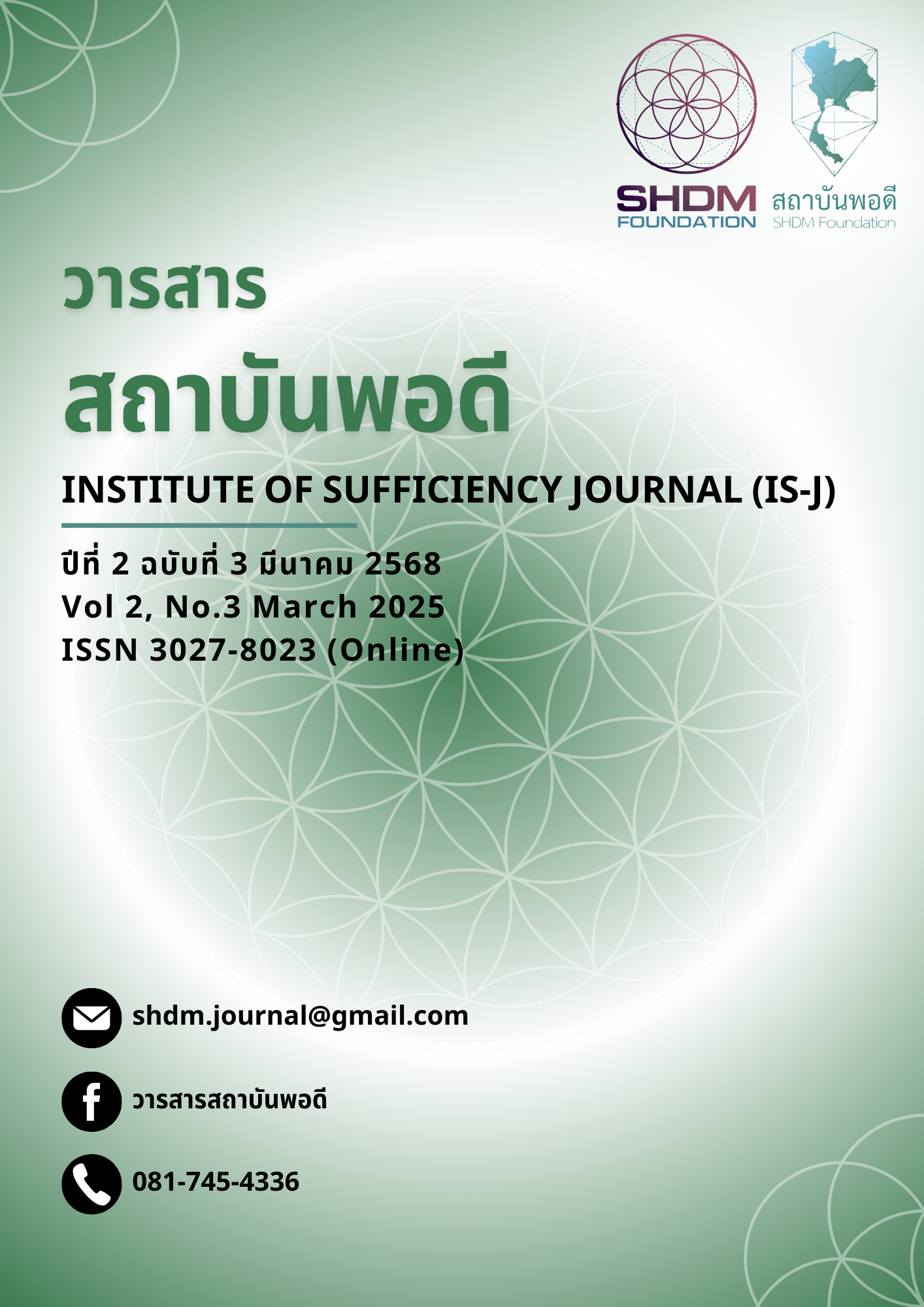
March
Vol. 2 No. 3 (2025)Editorial
Institute of Sufficiency Journal, Vol. 2 No. 3, March 2025The research and academic articles published in the Institute of Sufficiency Journal, Volume 2, Issue 3, March 2025, have been well received by researchers, academics, university lecturers from various institutions, as well as independent scholars who have shown continuous interest in submitting their work for publication. The journal is also honored to receive the support of distinguished experts in multiple disciplines, who serve as advisors, editorial board members, and peer reviewers. Their expertise plays a crucial role in enhancing the academic quality of the journal in accordance with the evaluation criteria of the Thai Journal Citation Index Centre (TCI).
This issue comprises four research articles and two academic articles, as follows:
Research Articles
-
Promoting the Strengthening of Local Weaving Women's Community Enterprise in U Thong District, Suphanburi Province, Towards Economic Sustainability
This study examines the development of creative prototype products and the enhancement of marketing mechanisms through digital channels for a traditional weaving community. Using a mixed-methods approach, the research identifies five key marketing components and proposes online strategies to increase sales and expand customer reach effectively. -
Psychological Traits and Administrative Competency of Educational Personnel in the Primary Educational Service Area Office
This quantitative study analyzes the relationship between psychological traits and administrative competency among educational personnel in the primary education sector. The findings reveal that both variables are at a high level and moderately correlated with statistical significance, emphasizing the importance of developing psychological traits to enhance professional competency. -
Characteristics of Administrators in the Digital Era and Academic Administration Effectiveness of Educational Personnel, Office of Educational Service Area Administration
This study explores the relationship between digital-era leadership characteristics and the effectiveness of academic administration. The results show a moderate positive correlation, particularly in academic planning, instructional management, and curriculum development, highlighting the importance of digital citizenship and adaptive leadership in educational management. -
Inner Development Goals Based on the Moderate Postmodern Philosophy
This article proposes the ADEP Model—comprising Adaptive Structure, Dynamic Balance, Exploratory Learning, and Postmodern Pragmatism—as a conceptual framework for developing Inner Development Goals (IDG) grounded in moderate postmodern philosophy. The model supports a balanced integration of rationality, emotion, and spirituality, adaptable to diverse contexts.
Academic Articles
-
Adhitthana Paramita in Theravada Buddhist Philosophy
This article examines the meaning and significance of Adhitthana Paramita at various levels based on the Tipitaka and commentaries. It introduces the ACTS model—Aspiration & Action, Commitment & Consistency, Transformation & Tenacity, and Self-Discipline & Service—as a practical framework for personal development, education, and ethical leadership. -
The Application of the 15th Royal Working Principle: Cultivating the Forest in People’s Hearts
This article explores King Bhumibol’s concept through the lenses of environmental philosophy, virtue ethics, and Buddhist philosophy. It proposes the C.A.R.E. model—Consciousness, Action, Resilience, and Ecosystem—as a means to foster environmental awareness and sustainable behavioral change through a value-based framework.
All articles in this issue have undergone a thorough review process. The editorial board conducted an initial quality screening before submitting each article to three independent experts for peer review. The selection process strictly follows the standards set by the Thai Journal Citation Index Centre (TCI), with emphasis on the alignment of each article to the journal’s objectives and its contribution to applicable academic knowledge.
The editorial board sincerely hopes that the articles published in this issue will serve as a valuable contribution to advancing knowledge in education, administration, philosophy, and sustainable social development in Thailand and beyond.
-
-
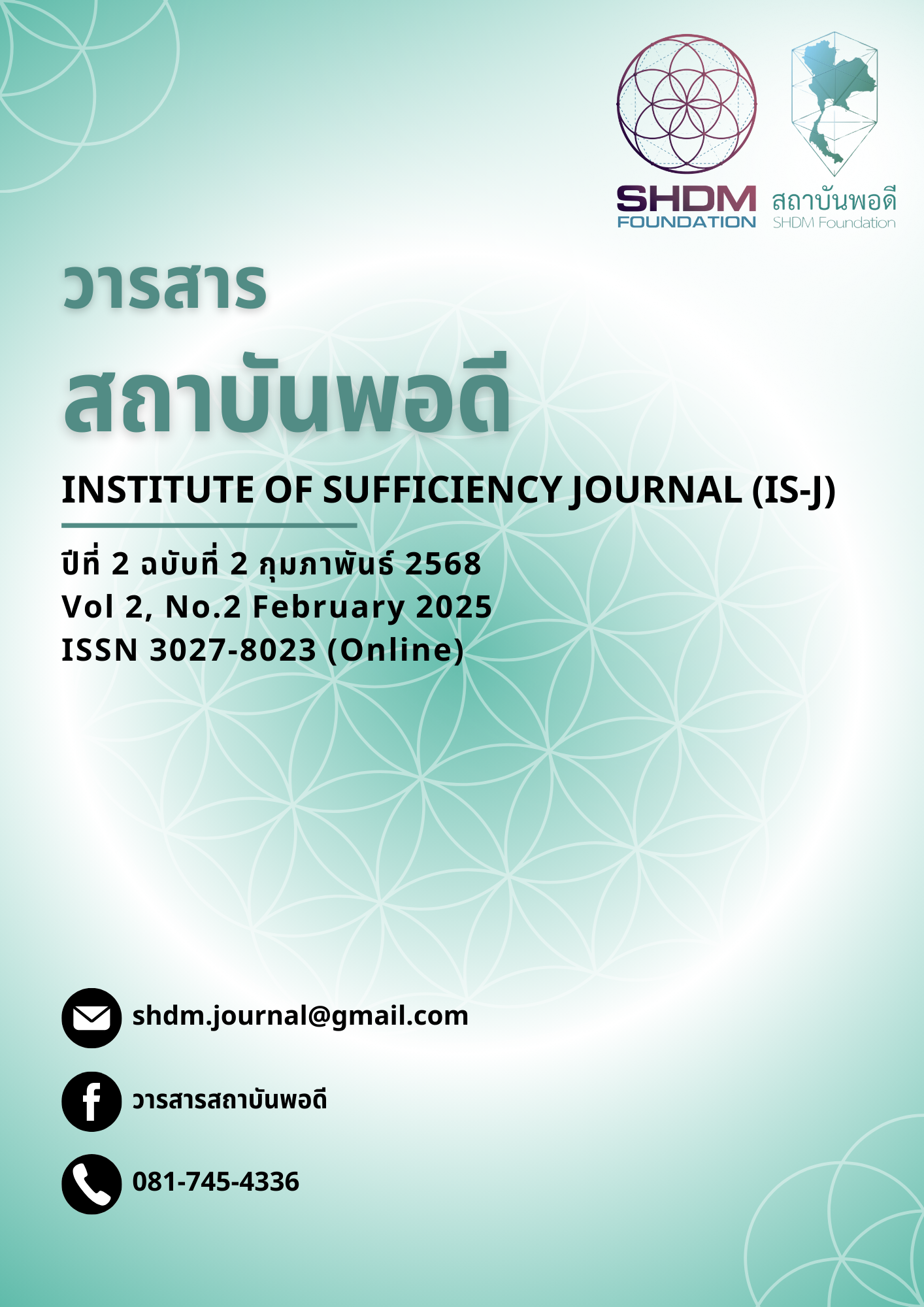
February 2025
Vol. 2 No. 2 (2025)The research and academic articles featured in the Institute of Sufficiency Journal, Volume 2, Issue 2, February 2025, continue from the previous issue, as many authors have shown great interest in publishing their research and academic works in this journal. Additionally, we are honored to receive support from distinguished faculty members from various universities, as well as independent scholars, who have kindly contributed as advisors, editorial board members, and peer reviewers. Each of these esteemed individuals possesses deep expertise in their respective fields of study.
This issue includes four research articles and two academic articles, as follows:
-
Research Articles:
- A Study of Factors Influencing the Development of PLC Activities among Teachers in the Kwangkham School Network, Khao Suan Kwang District, Khon Kaen Province
- Administrative Factors and Educational Quality in Private Schools under the Office of the Private Education Commission in a Region of Thailand
- The Relationship Between Organizational Climate and Work Happiness Among Teachers and Educational Personnel Under the Udonthani Primary Educational Service Area Office 1
- A Comparative Study of Zygmunt Bauman’s Ethics and Immanuel Kant’s Ethics
-
Academic Articles:
- Sacca Pāramī (Perfection of Truth) in Theravāda Buddhist Philosophy
- Application of the 14th Royal Working Principle: Using “Adhamma” to Counter “Adhamma”
The final academic article continues the study from previous journal issues, which have explored the application of each Royal Working Principle. This issue focuses on the 14th principle, where the term "Adhamma" in this context does not directly refer to immoral actions but rather to strategies or measures that may not align with conventional approaches or traditional frameworks. These methods aim to restore balance and resolve societal challenges. This collection of articles reflects the journal’s broad academic scope, covering social sciences, philosophy, administration, and Buddhist studies, with practical implications in various contexts.
All articles in this issue have undergone rigorous quality assessments by expert peer reviewers. The editorial board prioritizes articles that align with the journal’s objectives, selecting high-quality submissions before forwarding them to three qualified reviewers for further evaluation. The selected articles meet the quality standards set by the Thai Journal Citation Index Centre (TCI).
The editorial board sincerely hopes that the research articles published in this journal will contribute to the advancement of knowledge in education and benefit academic institutions and society as a whole.
-
-
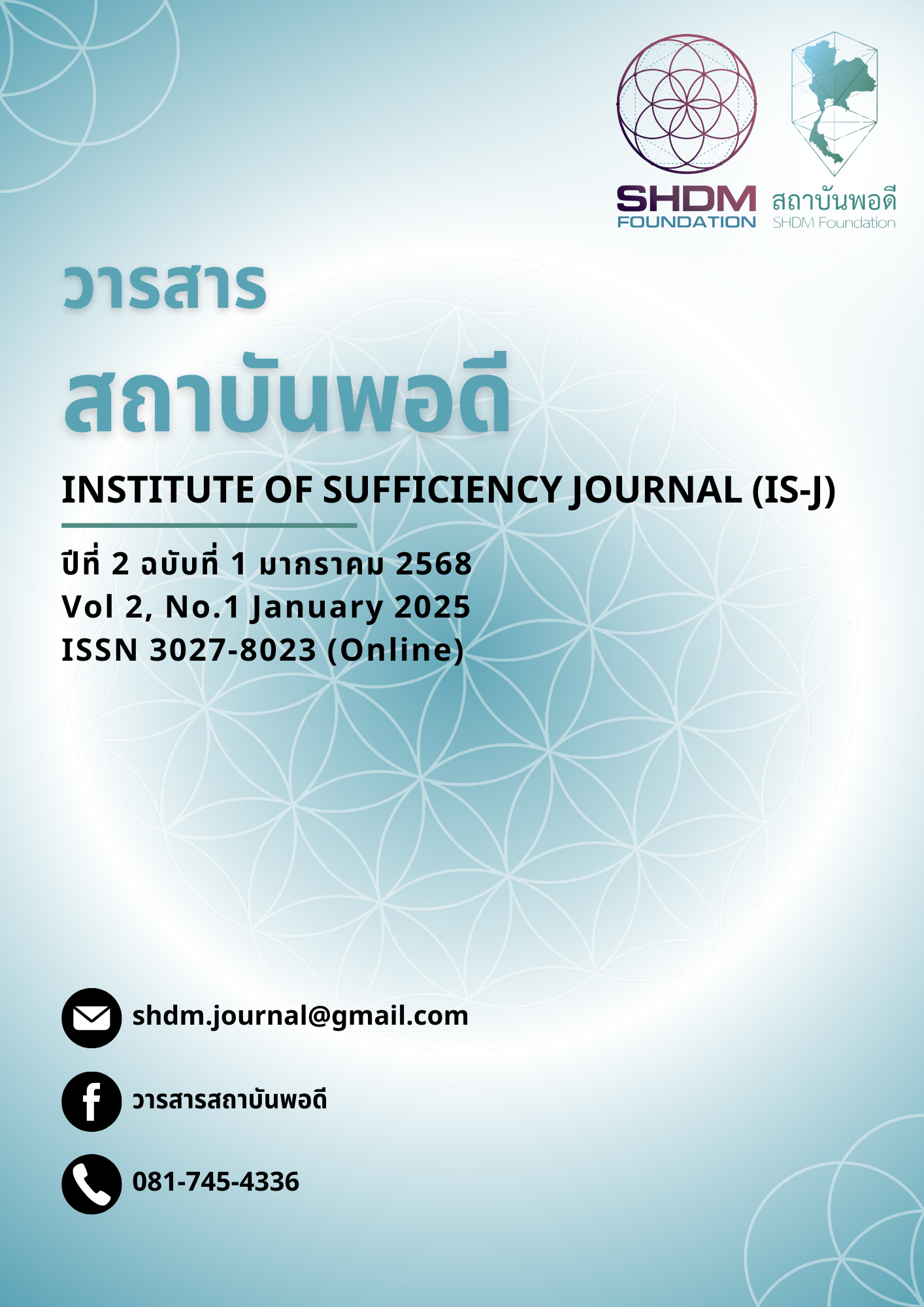
January 2025
Vol. 2 No. 1 (2025)The Institute of Sufficiency Journal, Volume 2, Issue 2, for January 2025, features a continuation of research and academic articles submitted from the previous issue. Many authors have shown great interest in publishing their research and academic works in this journal. Additionally, the journal has received generous support from professors of various universities and independent scholars who have graciously contributed as advisors, editorial board members, and expert reviewers. Each of these contributors is highly proficient in their respective fields of expertise.
This issue includes three research articles and two academic articles:
-
Research Articles:
- The Four Noble Truths for Organizational Development
- Analysis of the Concept of Grand Narratives in the Postmodern Philosophy of Jean-François Lyotard
- Analysis of Zygmunt Bauman's Ethics in Postmodern Ethics
-
Academic Articles:
- Khanti Paramita in Theravada Buddhist Philosophy
- The Application of the 13th Royal Working Principle : Using Nature to Help Nature
The final academic article in this issue is a continuation of previous studies published in the journal, which discussed the application of the principles of royal initiatives. This issue specifically focuses on Principle No. 13: Promoting Natural Restoration Through Natural Processes. This highlights the academic diversity covered in the journal, encompassing social dimensions, philosophy, management, and Buddhist studies, along with practical approaches that can be applied in various contexts.
All articles in this issue have undergone rigorous quality evaluation. The editorial board prioritizes articles that align with the journal's objectives. Initially, selected articles are screened for preliminary quality checks before being sent to three expert reviewers for thorough evaluation. This process ensures that all published works meet the quality standards outlined by the Thai Journal Citation Index Centre (TCI).
The editorial board sincerely hopes that the research articles published in this issue will contribute significantly to the advancement of academic knowledge, benefiting educational institutions and society at large.
-
-
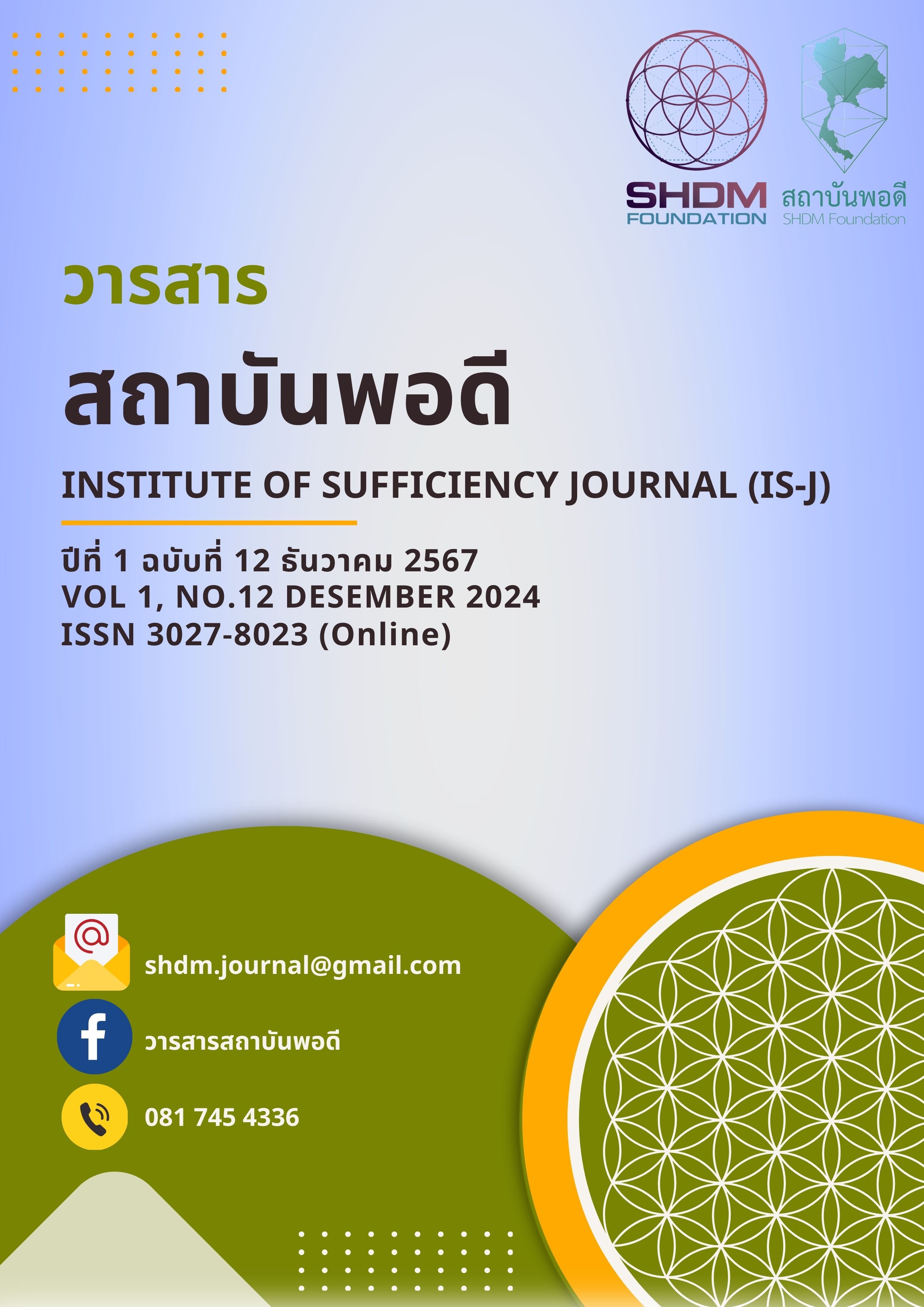
December
Vol. 1 No. 12 (2024)The Institute of Sufficiency Journal, Volume 1, Issue 12, for December 2024, features a continuation of research and academic articles submitted from the previous issue. Many authors have shown great interest in publishing their research and academic works in this journal. Additionally, the journal has received generous support from professors of various universities and independent scholars who have graciously contributed as advisors, editorial board members, and expert reviewers. Each of these contributors is highly proficient in their respective fields of expertise.
This issue includes three research articles and two academic articles:
-
Research Articles:
- Organizational Management Based on the Middle Path Postmodern Philosophy
- The Application of the Four Noble Truths in Business Practices
- Analysis of the Roles of Volunteer Monks in Caring for the Sick
-
Academic Articles:
- The Perfection of Diligence in Theravāda Buddhist Philosophy
- The Application of the 11th Royal Working Principle: Public Benefit
The final academic article builds on studies from previous journal issues, focusing on the application of the Royal Working Principles. In this issue, the emphasis is on Principle 11, which highlights the importance of public benefit. These works collectively reflect a rich diversity of academic perspectives, encompassing social, philosophical, administrative, and Buddhist dimensions. They also offer practical approaches applicable across various contexts.
All articles in this issue have undergone rigorous quality evaluation. The editorial board prioritizes articles that align with the journal's objectives. Initially, selected articles are screened for preliminary quality checks before being sent to three expert reviewers for thorough evaluation. This process ensures that all published works meet the quality standards outlined by the Thai Journal Citation Index Centre (TCI).
The editorial board sincerely hopes that the research articles published in this issue will contribute significantly to the advancement of academic knowledge, benefiting educational institutions and society at large.
-
-
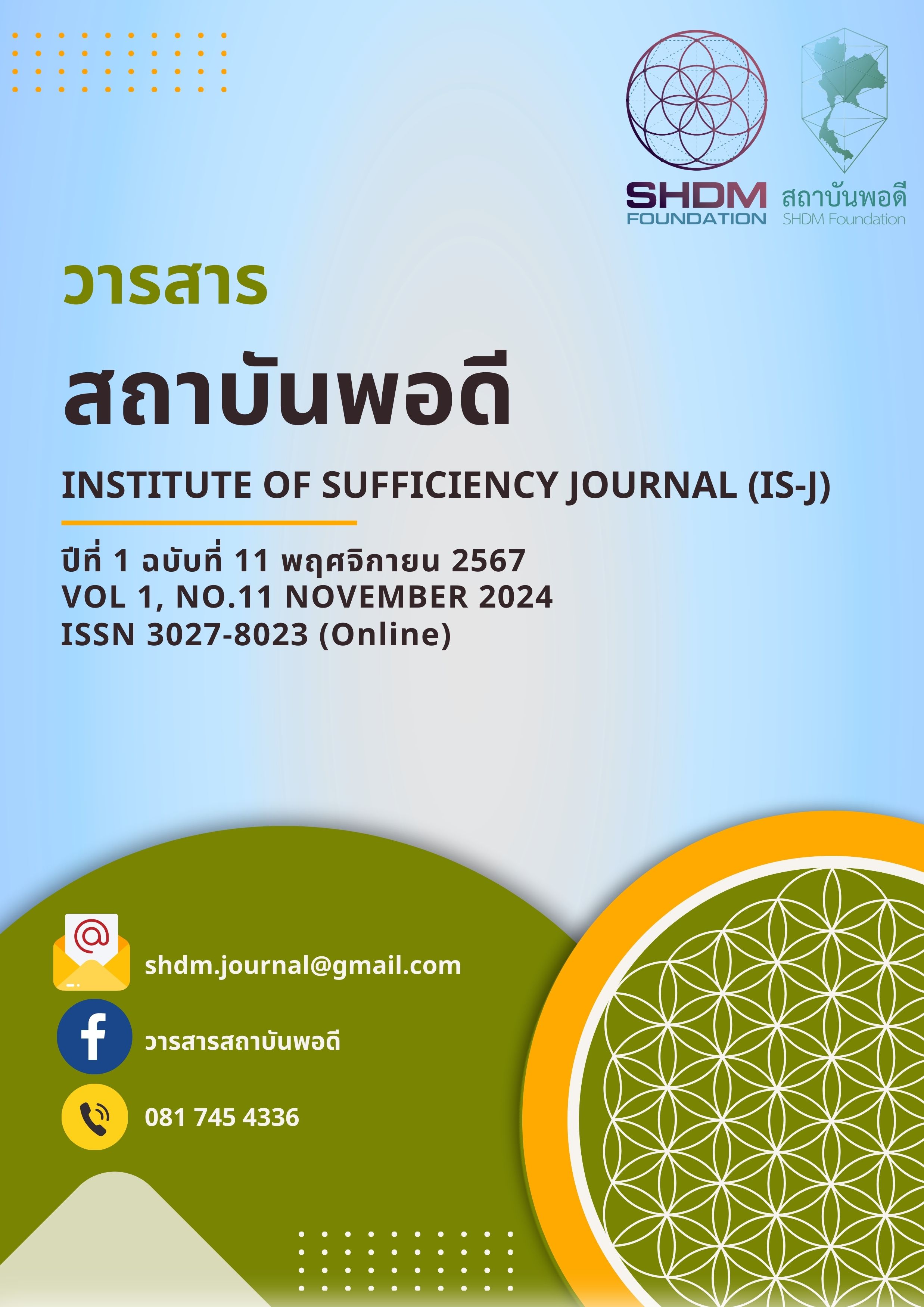
November
Vol. 1 No. 11 (2024)Research Articles and Academic Articles in the Institute of Sufficiency Journal, Vol. 1, Issue 11, November 2024
The Institute of Sufficiency Journal, Vol. 1, Issue 11, November 2024, continues its dedication to publishing high-quality research and academic articles, following the strong reception of previous issues. This journal has become a preferred platform for authors to disseminate their scholarly work. In this issue, the journal benefits from the valuable support of distinguished professors from various universities and independent scholars, who have contributed as advisors, editorial board members, and expert reviewers. Each of these contributors brings deep expertise in their respective fields.
This issue includes three research articles and two academic articles. The research articles are:
- Quality of Work Life Based on Middle-Way Postmodern Philosophy
- Application of the Four Noble Truths in Problem-Based Learning Management
- Personnel Management Based on the Principles of Aparihaniyadhamma in Buddhist Universities
The academic articles featured are:
- Wisdom Perfection in Theravāda Buddhist Philosophy
- The Application of theTwelfth Principle of King Bhumibol's Working Principles: One-Stop Service
The second academic article continues a series on the application of King Bhumibol's Working Principles. This installment focuses on the Twelfth Principle, emphasizing integrated one-stop service delivery. These articles represent a wide spectrum of topics across philosophy, management, and education, showcasing practical applications that are adaptable to diverse contexts.
All articles in this issue have been rigorously reviewed by expert scholars to ensure they meet the journal’s standards and objectives. The editorial board conducted an initial screening before sending the submissions for evaluation by three peer reviewers in line with the guidelines of the Thai Journal Citation Index Centre (TCI).
The editorial board is confident that the research and academic articles in this issue will significantly contribute to the development of knowledge in education and related fields, and will be of great benefit to academic institutions and society as a whole.
-
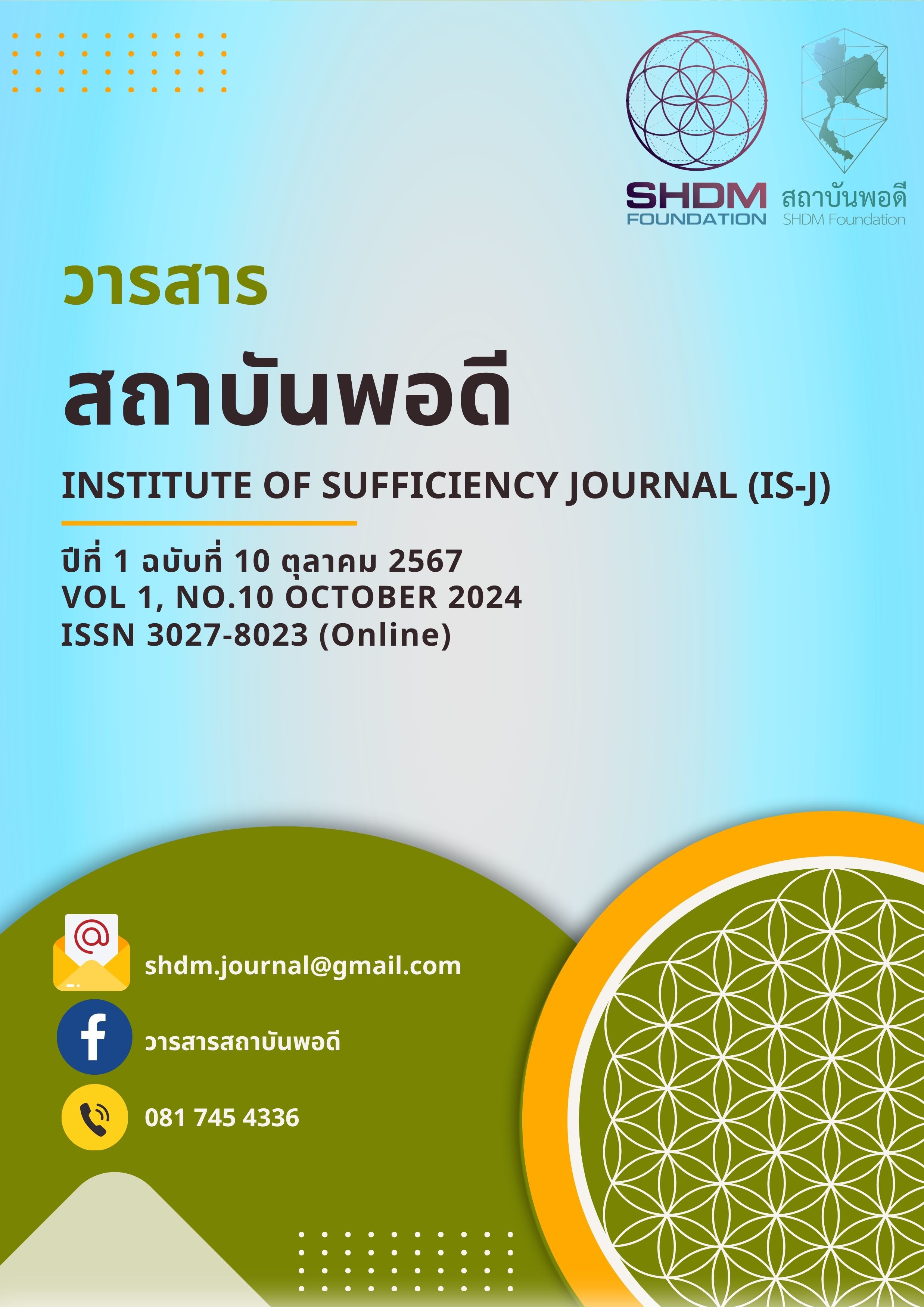
October
Vol. 1 No. 10 (2024)Research Articles and Academic Articles in the Institute of Sufficiency Journal, Vol. 1, Issue 10, October 2024 continues to publish both research and academic articles from the previous issue. Many authors have shown great interest in publishing their research and academic work in this journal, and this issue benefits from the valuable support of professors from various universities and independent scholars, who have contributed as advisors, editors, and expert reviewers. Each contributor is highly knowledgeable in their field of expertise.
This issue contains three research articles and two academic articles. The research articles include: Self-Management, People Management, and Work Management Based on Middle Path Postmodern Philosophy, Problem-Based Learning: Analytical, Descriptive, and Typological Study, and Achievement Study of On-Hand Learning in Social Studies for Grade 4 Students at Wat Ban Ao School (Ban Ao Witthayakarn), Phra Nakhon Si Ayutthaya Province. The academic articles cover Nekkhamma Paramita in Theravada Buddhist Philosophy and a piece on The Application of Royal Principles, continuing from previous issues, focusing on Principle 10: Collaboration.
These articles have undergone a thorough review process by qualified experts to ensure alignment with the journal's objectives. Each submission is preliminarily selected by the editorial board before being evaluated by three expert reviewers according to the standards of the Thai Journal Citation Index Centre (TCI).
The editorial board hopes that the research articles published in this issue will contribute to the advancement of educational knowledge and prove beneficial for educational institutions and the nation.
-
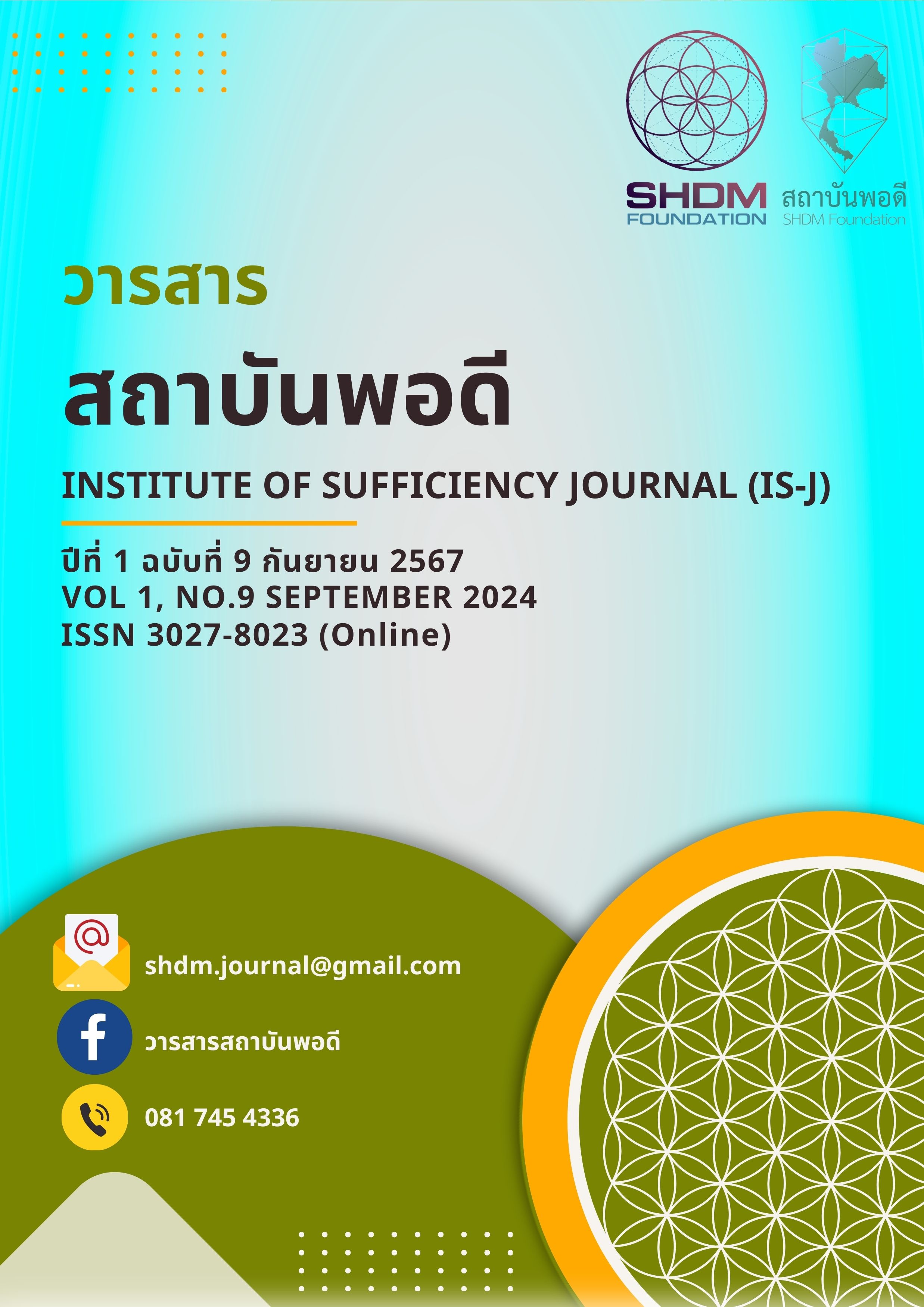
September
Vol. 1 No. 9 (2024)The research articles and academic papers in the 1st year, 9th issue of the "Institute of Sufficiency Journal" for September 2024 continue to include research articles and academic papers submitted from the previous issue. This is because many authors prefer to publish their research and academic papers in the Pordi Institute Journal. Additionally, we are fortunate to have the support of professors from various universities and independent scholars who kindly serve as consultants, editors, and expert reviewers. Each of them is highly skilled in their respective fields.
This issue consists of 3 research articles and 2 academic papers. The topics include: the philosophy of education according to the middle-way postmodern philosophy, the qualities of a good leader based on middle-way postmodern philosophy, and the development of academic achievement on the topic of religious etiquette through Activity-Based Learning for 4th-grade students at Ban Mae Salid Luang Wittaya School, Tak Province. The academic papers include "Sīla (Morality) Perfections in Theravāda Buddhist Philosophy" and a paper on the application of royal working principles. This ongoing series covers the application of the royal working principles from the first principle to the current issue, which discusses the 9th principle: "Make it Simple."
These articles have been thoroughly reviewed by expert evaluators, and the editorial board prioritizes articles that align with the journal’s objectives. The editorial team has pre-screened the articles for quality before forwarding them to three experts for evaluation according to the Thai Journal Citation Index Centre (TCI) standards.
The editorial board hopes that the published research in this issue will contribute to the development of educational knowledge and benefit educational institutions and the nation.
-
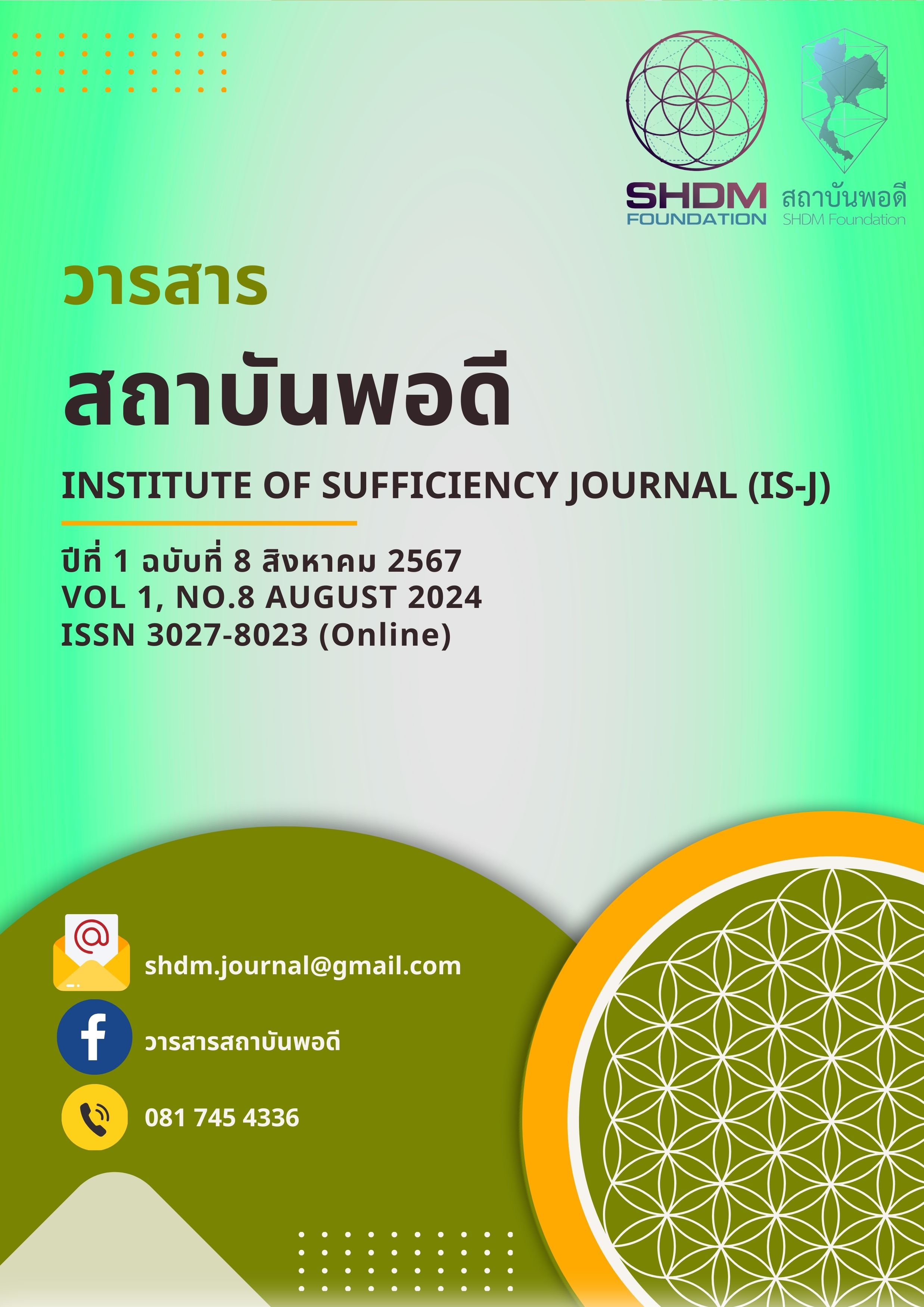
August
Vol. 1 No. 8 (2024)Research articles and academic articles in the "Pordee Institute Journal," Volume 1, Issue 8, August 2024, feature ongoing submissions from the previous issue. Many authors have chosen to publish both research and academic articles in the journal. Additionally, the journal has received the gracious support of professors from various universities and independent scholars, who have served as advisors, editorial board members, and expert reviewers. Each of these contributors is highly skilled in their respective fields.
This issue includes three research articles and two academic articles. The research articles cover the following topics: "Four Types of Personnel Management in Organizations According to Theravada Buddhist Philosophy," "A Study of Personal Factors Influencing Chinese Tourists' Decisions to Visit Wat Phra Kaew After the COVID-19 Pandemic," and "Social Well-being in the Context of Theravada Buddhist Philosophy." The academic articles include "The Perfection of Generosity in Theravada Buddhist Philosophy" and a continuation of previous work on the application of King Rama IX's work principles, specifically focusing on Principle 8: Economical, Simple, and Maximizing Benefits.
These articles have been thoroughly reviewed by experts and the editorial board, who prioritize content aligned with the journal's objectives. The editorial board has initially selected the articles based on quality before forwarding them to three experts for further review. The selected articles meet the quality standards of the Thai Journal Citation Index Centre (TCI).
The editorial board sincerely hopes that the research articles published in this issue will contribute to the development of educational knowledge, benefiting both educational institutions and the nation.
-
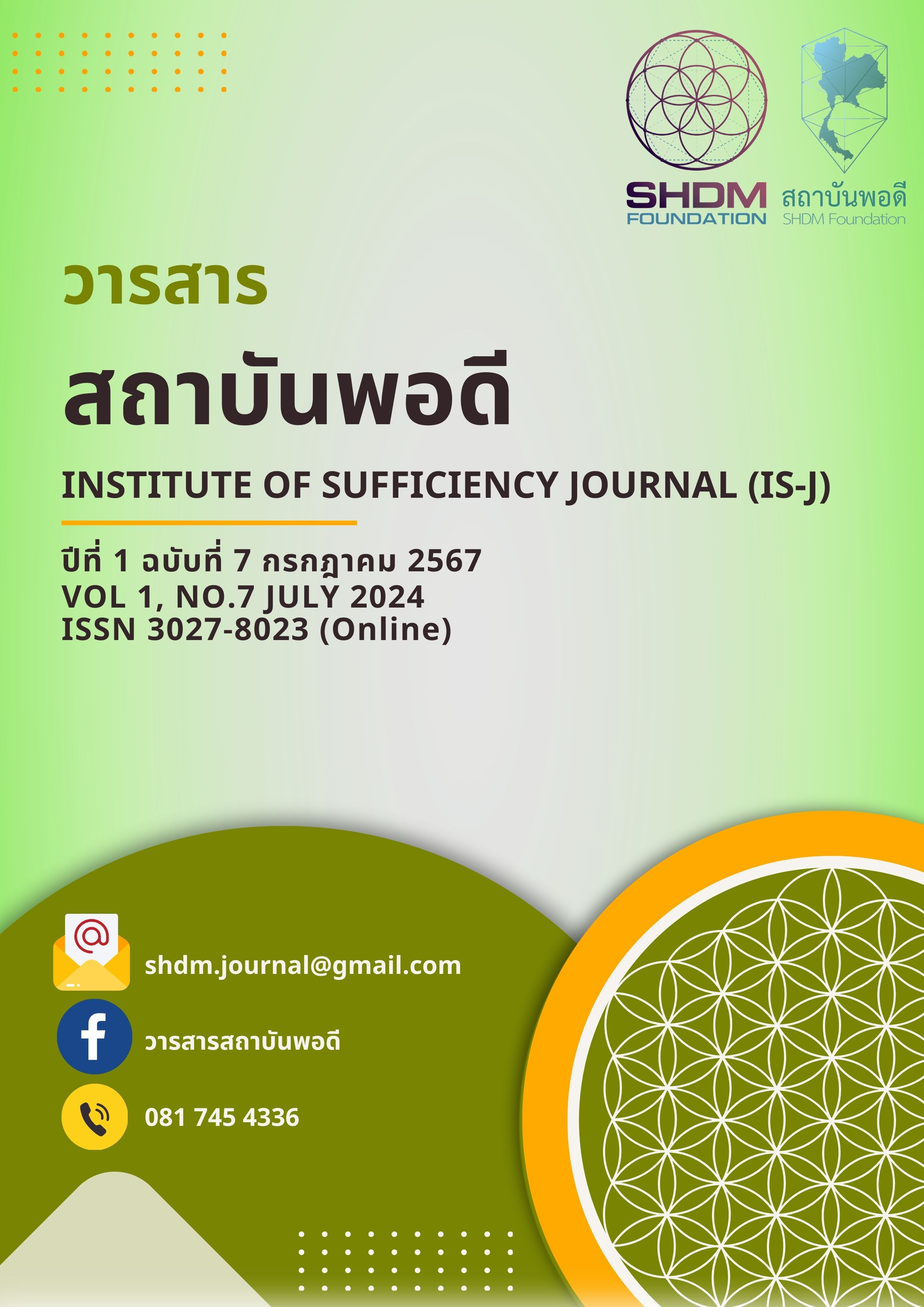
July
Vol. 1 No. 7 (2024)Research and academic articles in the Poddee Institute Journal, Volume 1, Issue 7, July 2024, have been submitted continuously from the previous issue. Many authors prefer to publish both their research and academic works in the institution's journal. Additionally, we have received generous support from faculty members across various universities and independent scholars who are willing to serve as advisors, editorial board members, and expert reviewers. Each of these individuals has significant expertise in their respective fields.
This issue includes three research articles and two academic articles. The research articles are: "Holistic Quality of Life Development Based on the Four Principles of Secular Ethics," "Governance Organizations for Sustainable Development," and "Sustainable Organization Development Through Buddhist Principles." The academic articles are: "Participatory Management Based on the Philosophy of Moderate Postmodernism" and "Application of Royal Work Principles," which is a continuation from previous issues, covering the application of the first principle to the current seventh principle: "Not Sticking to the Textbook."
These articles have been peer-reviewed by experts to ensure quality. The editorial board prioritizes articles that align with the journal's objectives. Initially, the editorial board selects articles based on quality before sending them to three experts for further peer review. The selected articles meet the quality assessment standards of the Thai Journal Citation Index Centre (TCI).
The editorial board sincerely hopes that the research articles published in this issue will contribute to the development of knowledge in education, benefiting educational institutions and the nation as a whole.
-
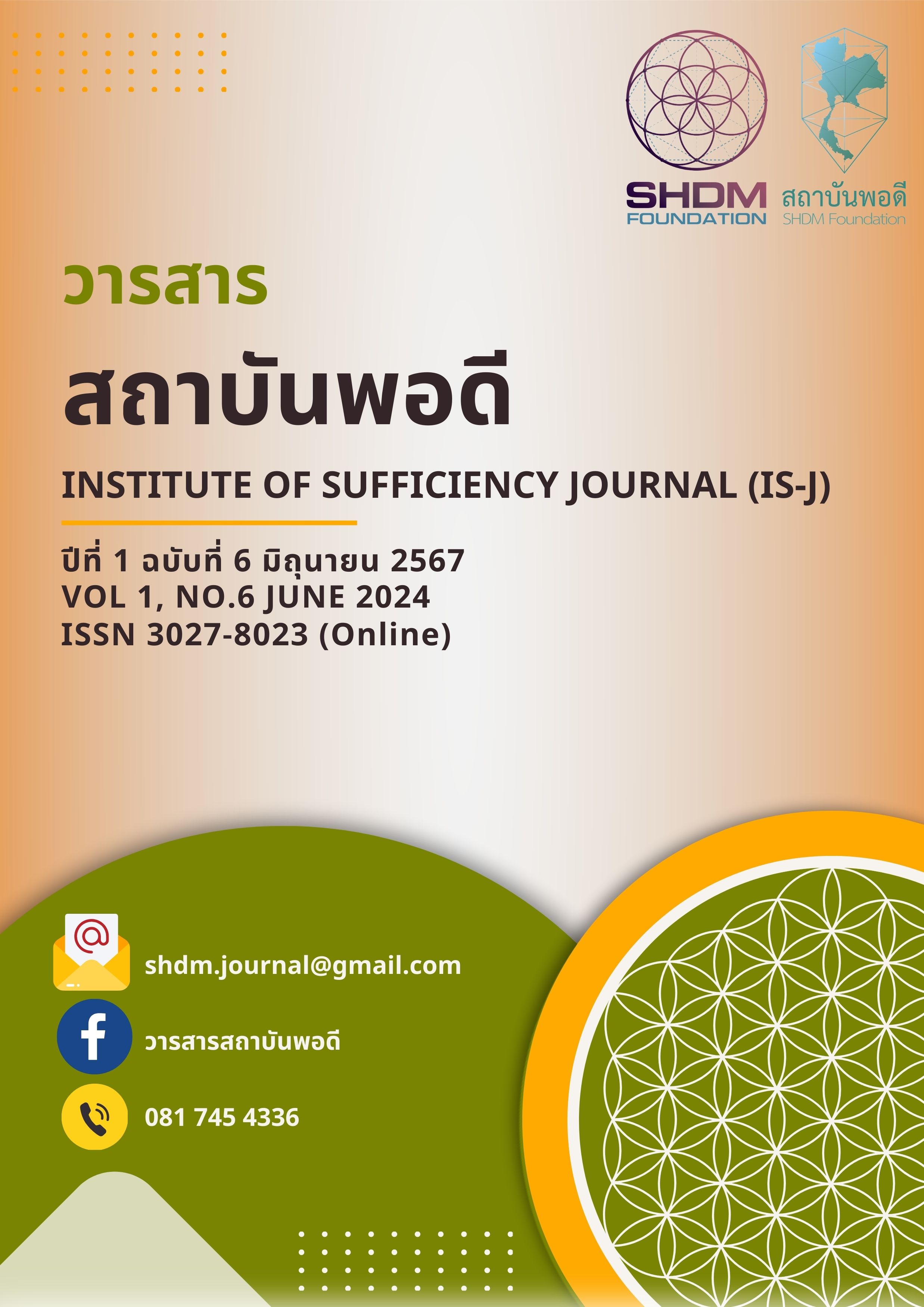
June
Vol. 1 No. 6 (2024)Research and academic articles in the institution's journal, Volume 1, Issue 6, June 2024, have been submitted continuously from the previous issue. Many authors prefer to publish both their research and academic works in the institution's journal. Additionally, we have received generous support from faculty members across various universities and independent scholars who are willing to serve as advisors, editorial board members, and expert reviewers. Each of these individuals has significant expertise in their respective fields.
This issue includes three research papers and two academic articles. The research papers are "The Application of Right Speech for Organizational Benefit," "Moral Leadership According to Middle Way Postmodern Philosophy," and "Using Activities to Foster Moderation in Life According to the Philosophy of Sufficiency Economy for Grade 5 Students at Wat Sala Wan School, Nakhon Pathom Province." The academic articles are "An Analytical Study on Methods to Overcome Anger by Phra Phutthakosa Chariya (P.A. Payutto)" and a continuing series on applying the King's Working Principles, with this issue focusing on Principle 6: Holistic Approach.
These articles have undergone rigorous evaluation by expert reviewers and the editorial board. The editorial team prioritizes articles that align with the journal's objectives. After an initial quality selection, each article is reviewed by three experts to ensure it meets the quality standards set by the Thai Journal Citation Index Centre (TCI).
The editorial board hopes that the research articles published in this issue will contribute significantly to the advancement of educational knowledge and be beneficial to educational institutions and the nation.
-
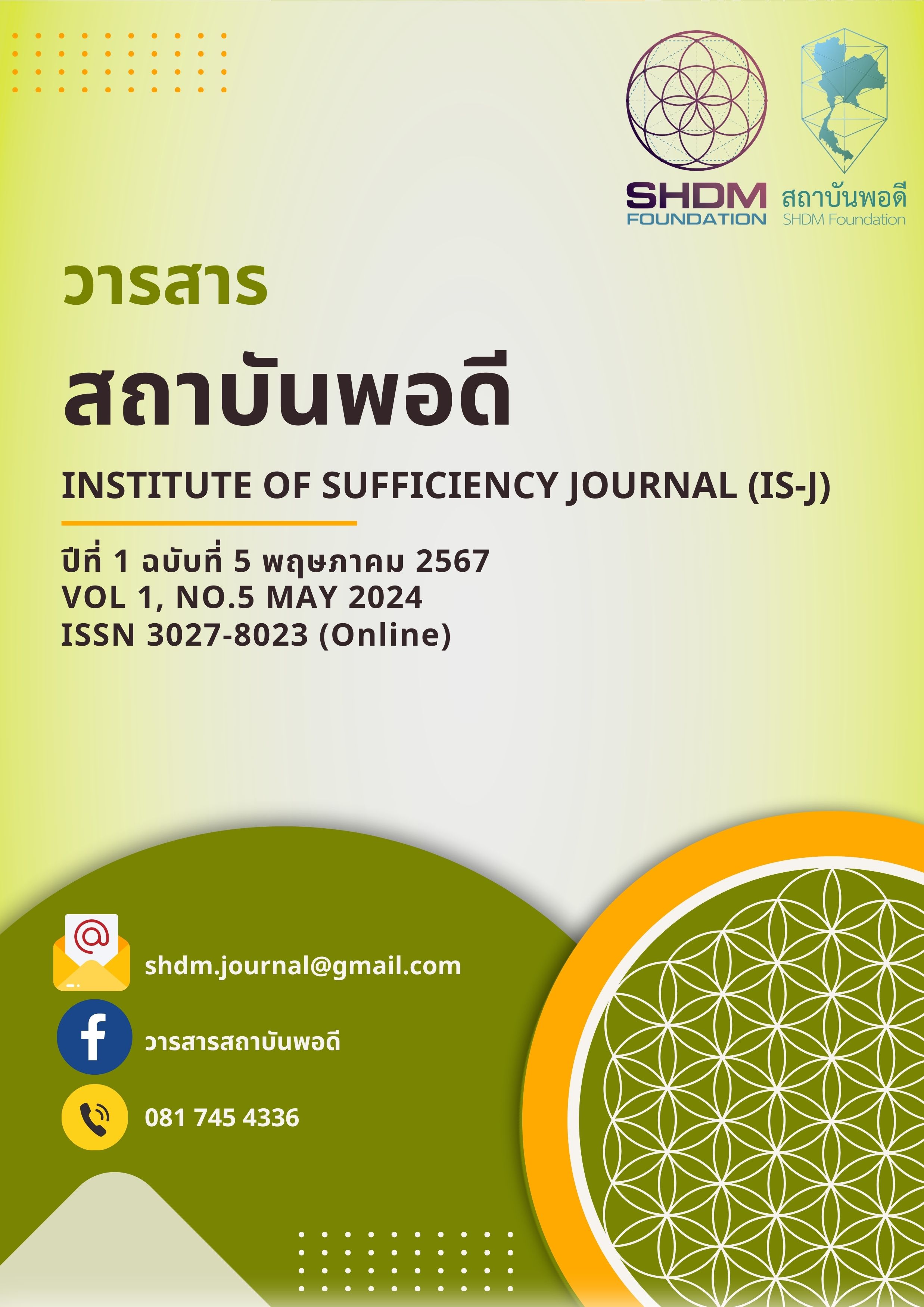
May
Vol. 1 No. 5 (2024)The research articles and academic papers in the institution's journal, Volume 1, Issue 5, in April 2024, There have been research articles and academic papers submitted continuously since the previous issue. This is because many authors have shown a preference for having their work published in the Podi journal, both in the research and academic article sections. Additionally, the journal has received generous support from various professors across universities, as well as independent scholars, who have graciously served as consultants, members of the editorial board, and qualified reviewers. Each of them possesses expertise in their respective fields.
This issue of the journal includes 2 research articles and 3 academic articles. The research articles are on Ethical Leadership according to the Philosophy of Middle-way Postmodernism and Motivation according to the Philosophy of Middle-way Postmodernism. The academic articles include Creating Well-being according to Theravada Buddhist Philosophy, the Application of Royal Initiative Principles (continuing from previous issues from the first principle to the fifth principle, which is Social Geography), and an interesting article on New Careers for Retirement. These articles have been peer-reviewed by experts to ensure quality. The editorial board prioritizes articles that align with the journal's objectives. The initial quality screening is done by the editorial board, and the selected articles are then sent to three experts for further peer review. Thus, the selected articles meet the quality assessment standards of the Thai Journal Citation Index Centre (TCI).
The editorial board hopes that the research articles published in this journal issue will contribute to the development of educational knowledge and benefit educational institutions and the nation as a whole.
-
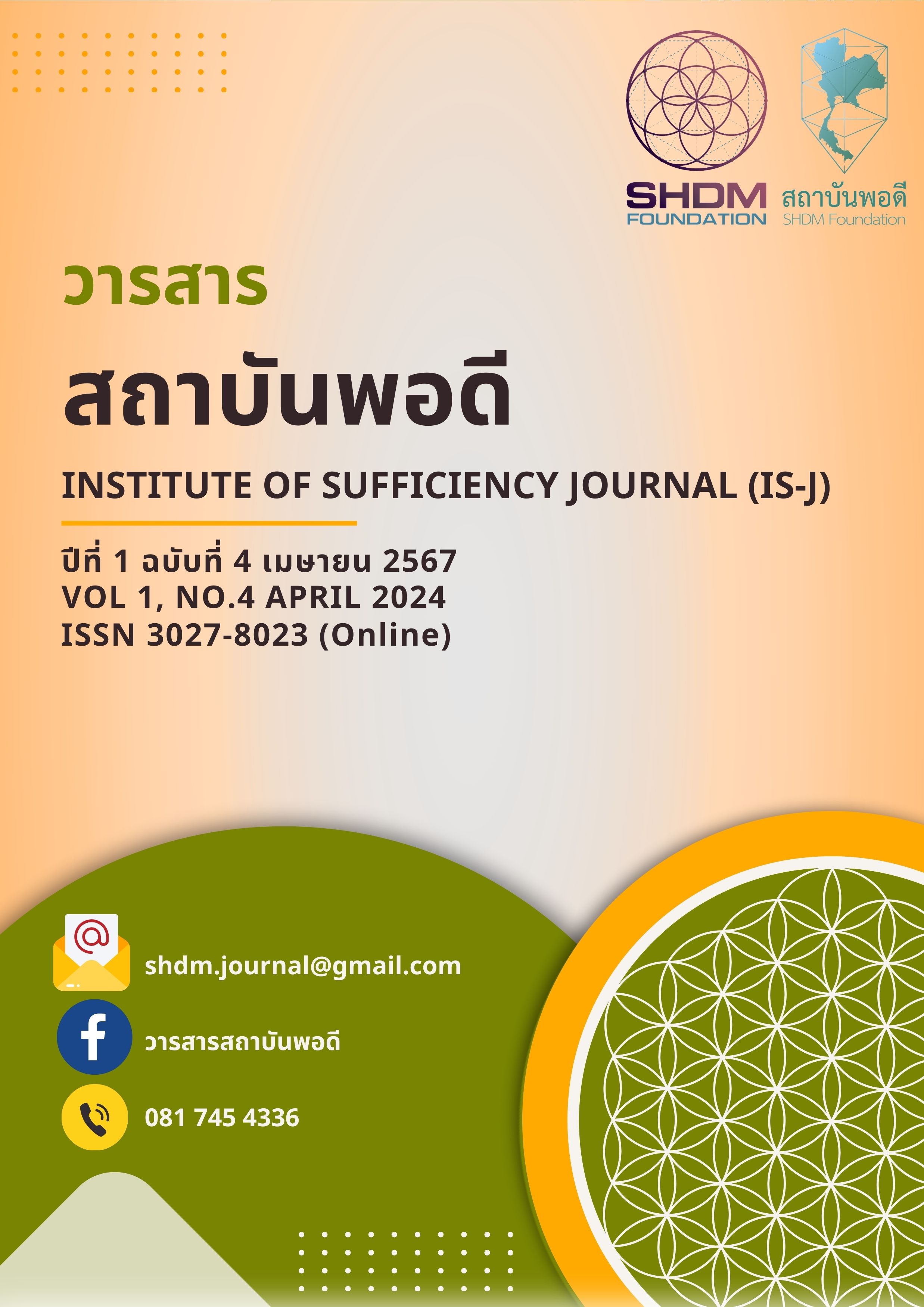
April
Vol. 1 No. 4 (2024)The research articles and academic papers in the institution's journal, Volume 1, Issue 4, in April 2024, There have been research articles and academic papers submitted continuously since the previous issue. This is because many authors have shown a preference for having their work published in the Podi journal, both in the research and academic article sections. Additionally, the journal has received generous support from various professors across universities, as well as independent scholars, who have graciously served as consultants, members of the editorial board, and qualified reviewers. Each of them possesses expertise in their respective fields.
This issue of the journal comprises 2 research articles and 3 academic papers. They cover topics related to employee happiness, risk management in organizations based on post-modern philosophy, and articles discussing happiness in organizations from a Buddhist perspective. Furthermore, there are academic papers discussing the application of work principles, which have been continuously published since the previous issues, starting from the application of work principles (item 1) up to this issue's application of work principles (item 4). Additionally, there are interesting academic papers regarding the experiential work of a non-governmental organization concerning innovative solutions for addressing the issues faced by farmers and vulnerable groups under the Galpona project.
These articles have undergone rigorous evaluation and screening by qualified reviewers to ensure their quality. The editorial board has prioritized articles that align with the journal's objectives, and initial screening has been conducted before proceeding with the next steps of the review process. Articles selected have met the criteria according to the standards set by the Thai Journal Citation Index Centre (TCI).
The editorial board hopes that the research articles published in this journal issue will contribute to the development of educational knowledge and benefit educational institutions and the nation as a whole.
-
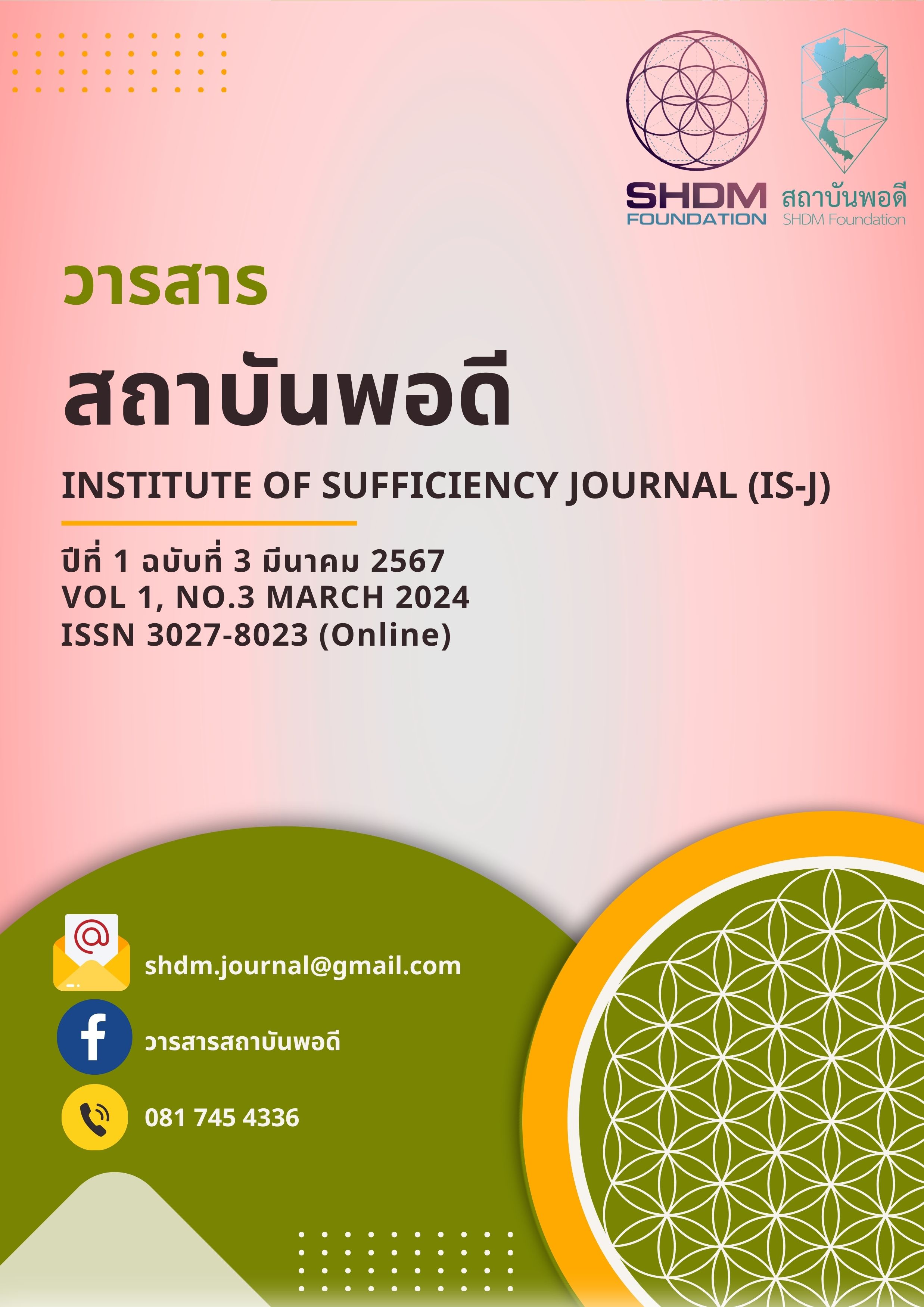
March
Vol. 1 No. 3 (2024)The academic articles and research papers in the Institute's Journal, Volume 1, Issue 3, March 2024, have seen a continuous flow of submissions from the previous issue. Many authors have requested space in the journal for publishing their work throughout the year 2024, as the online journal system has not yet been launched. Additionally, there has been generous support from various professors from different universities as well as independent scholars. They have graciously served as consultants, editorial board members, and qualified reviewers, each possessing expertise in their respective fields.
This issue of the journal comprises 2 research articles and 3 academic articles. The content covers topics related to governance companies based on post-Enlightenment philosophy, the principle of Dhammic principles for life quality development, Mettā (loving-kindness) supporting the world, and the application of the third noble truth principle to solve small-scale problems and criteria for determining sufficiency for high-value defense procurement decisions. These articles have undergone rigorous evaluation by qualified reviewers to ensure their quality. The editorial board prioritizes articles that align with the journal's objectives. The selected articles meet the initial quality standards before being forwarded for further evaluation by qualified reviewers, following a systematic process.
The editorial board hopes that the research articles published in this journal issue will contribute to the advancement of knowledge in the field of education and be beneficial to educational institutions and the country in the future.
-
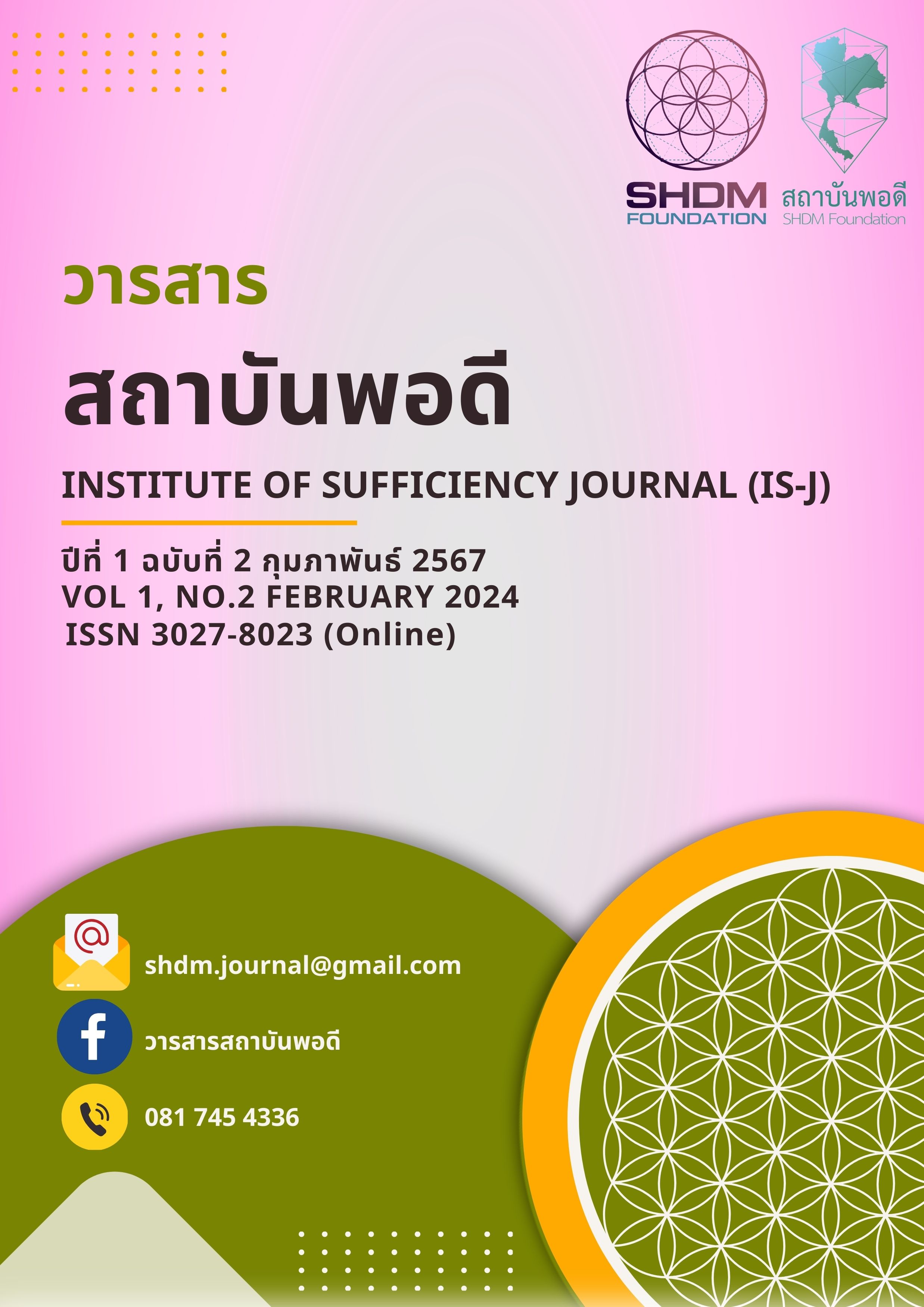
February
Vol. 1 No. 2 (2024)Academic articles and research papers in the Institute's Journal, Volume 1, Issue 2, February 2024, have seen a continuous stream of submissions from the previous issue. Many authors have requested space in the journal for publishing their work throughout the year 2567, as the online journal system has not yet been launched. Additionally, there has been generous support from various professors from different universities as well as independent scholars. They have graciously served as consultants, editorial board members, and qualified reviewers, each possessing expertise in their respective fields.
-
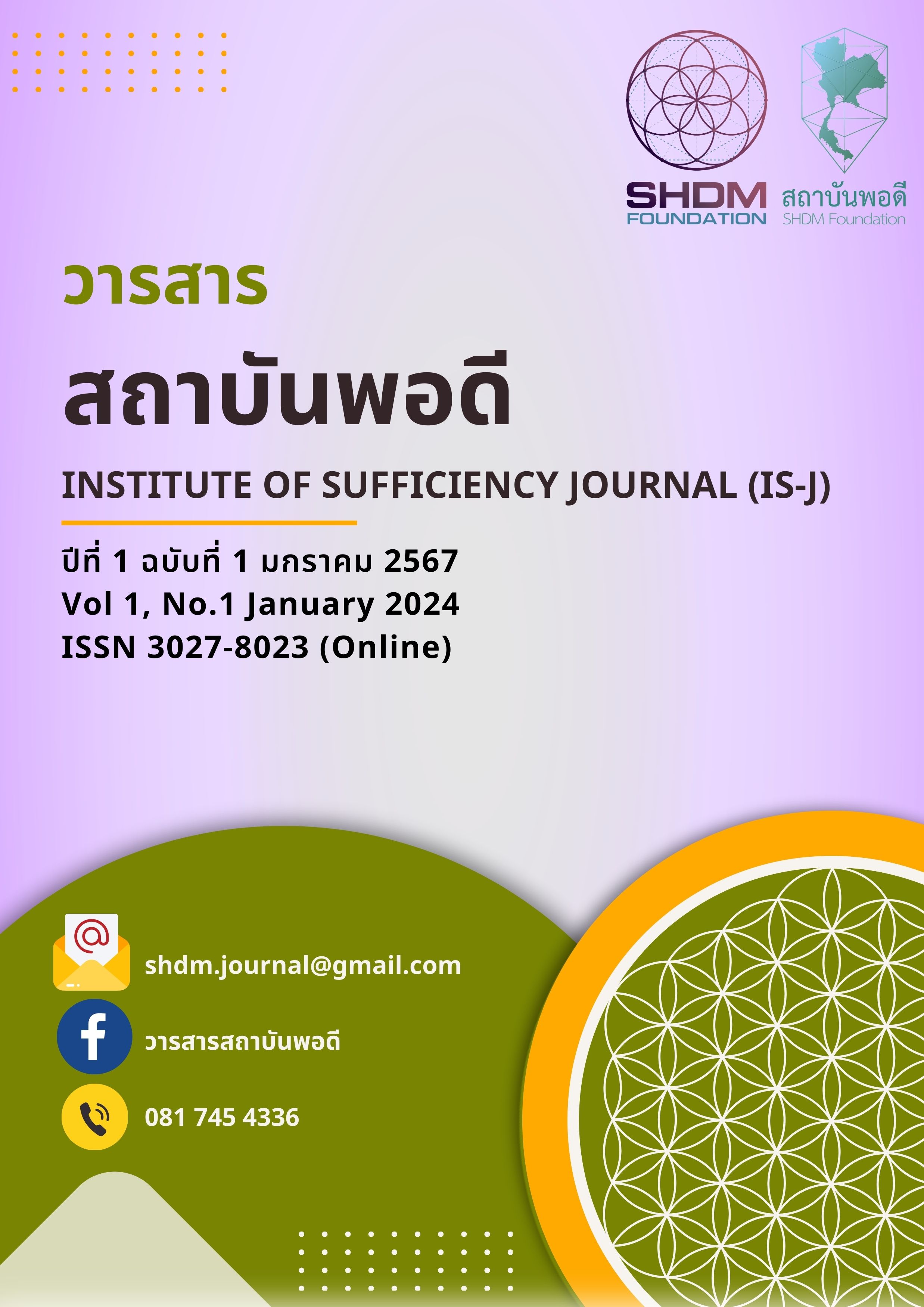
January
Vol. 1 No. 1 (2024)The inaugural issue of the institution's journal, Volume 1, Issue 1, January 2024, is considered this seminal issue. It contains academic articles and research papers of significant interest. Several authors have reserved space in the journal for the publication of their work throughout the year 2024, even before the online journal system is launched. Additionally, the journal has received generous support from various professors across universities, as well as independent scholars, who have graciously served as consultants, members of the editorial board, and qualified reviewers. Each of them possesses expertise in their respective fields.



